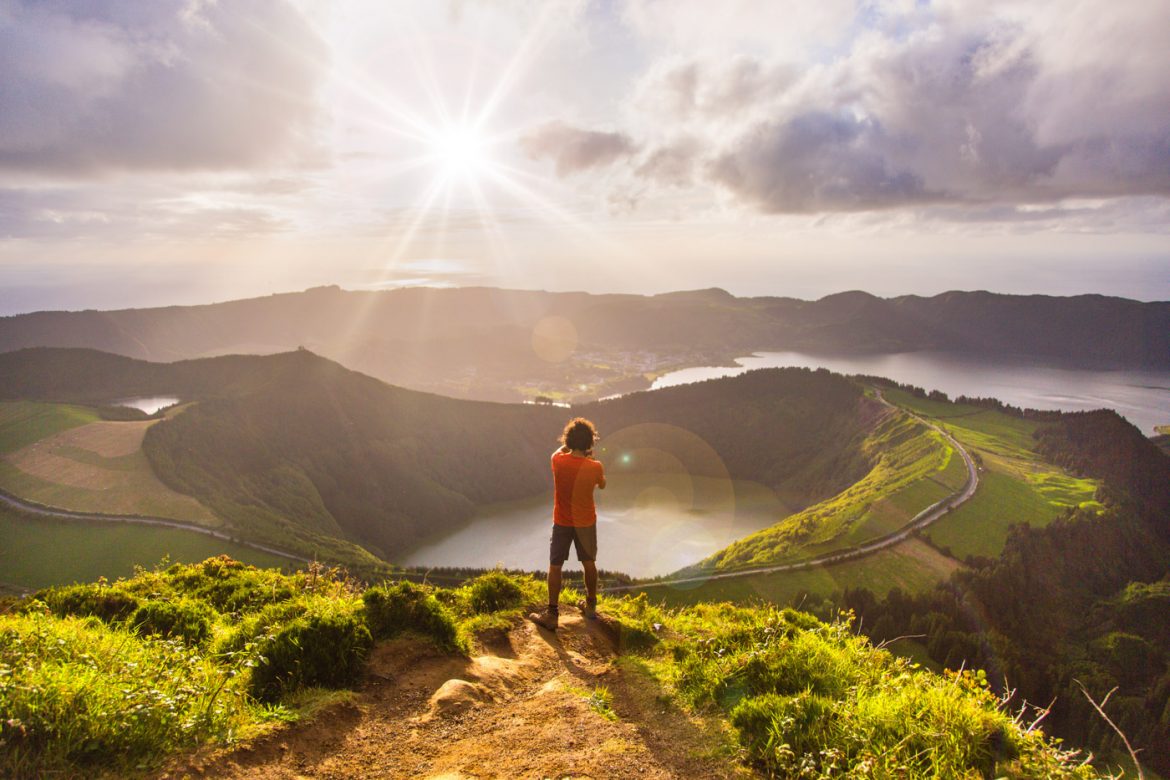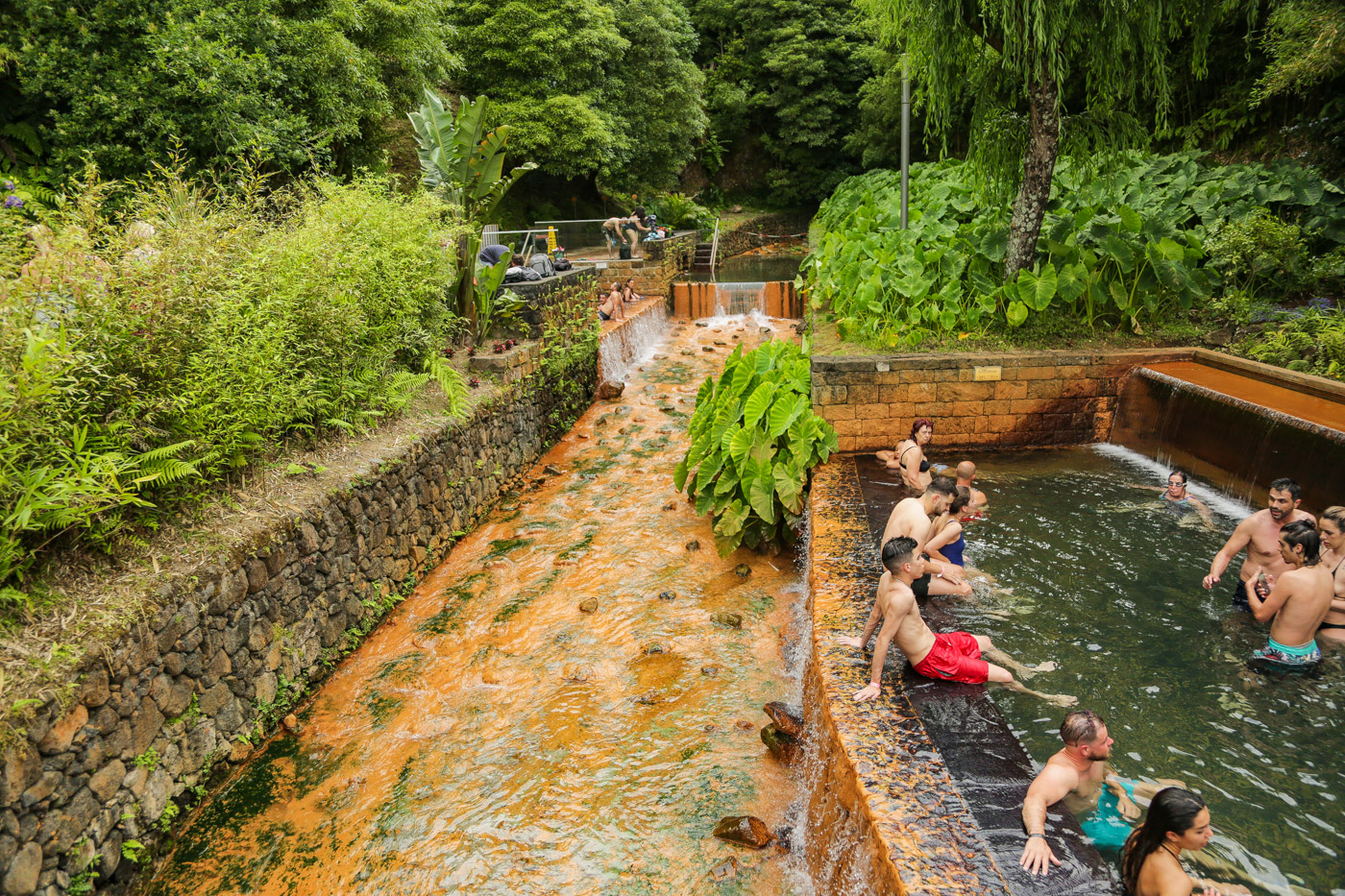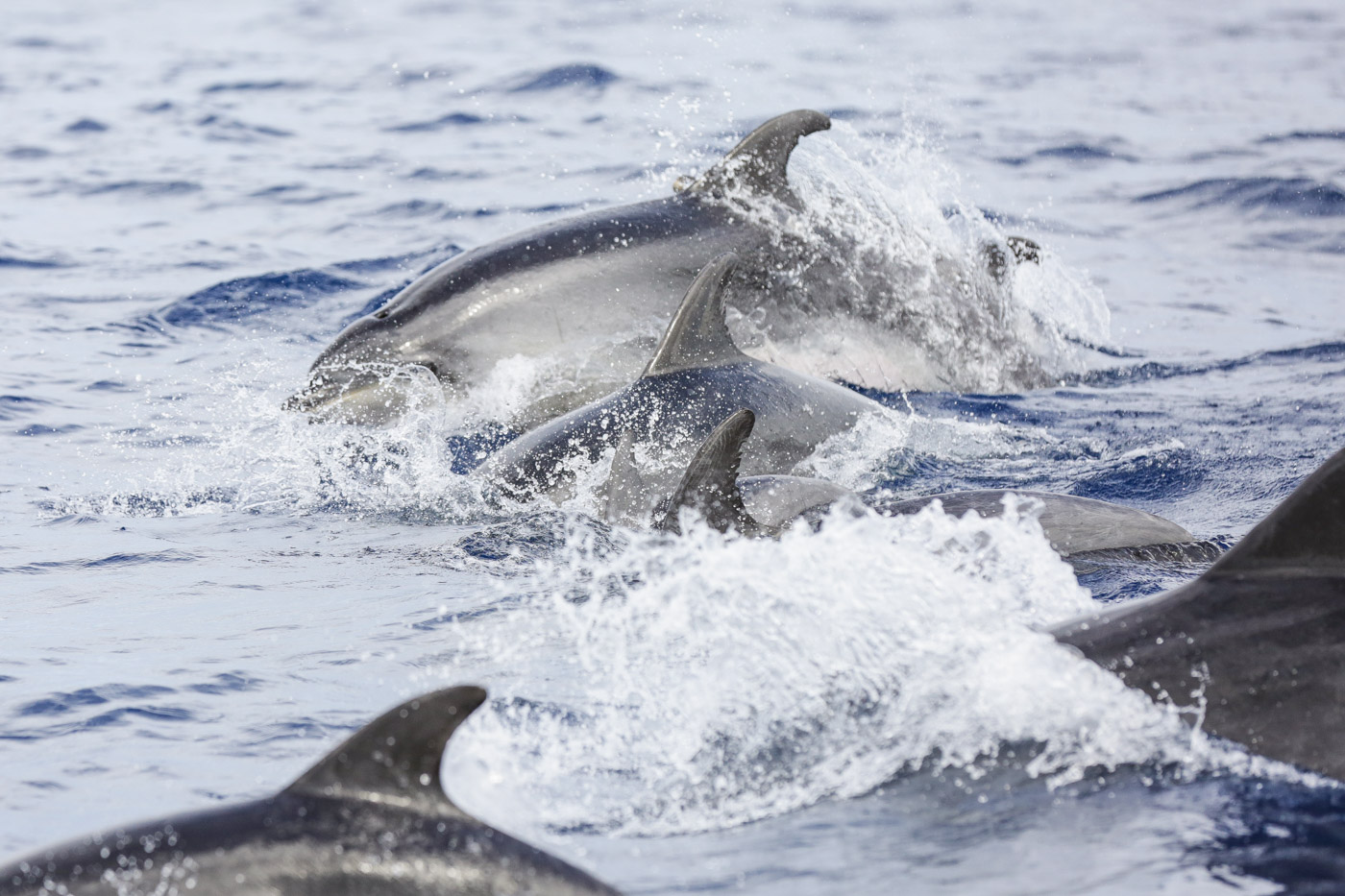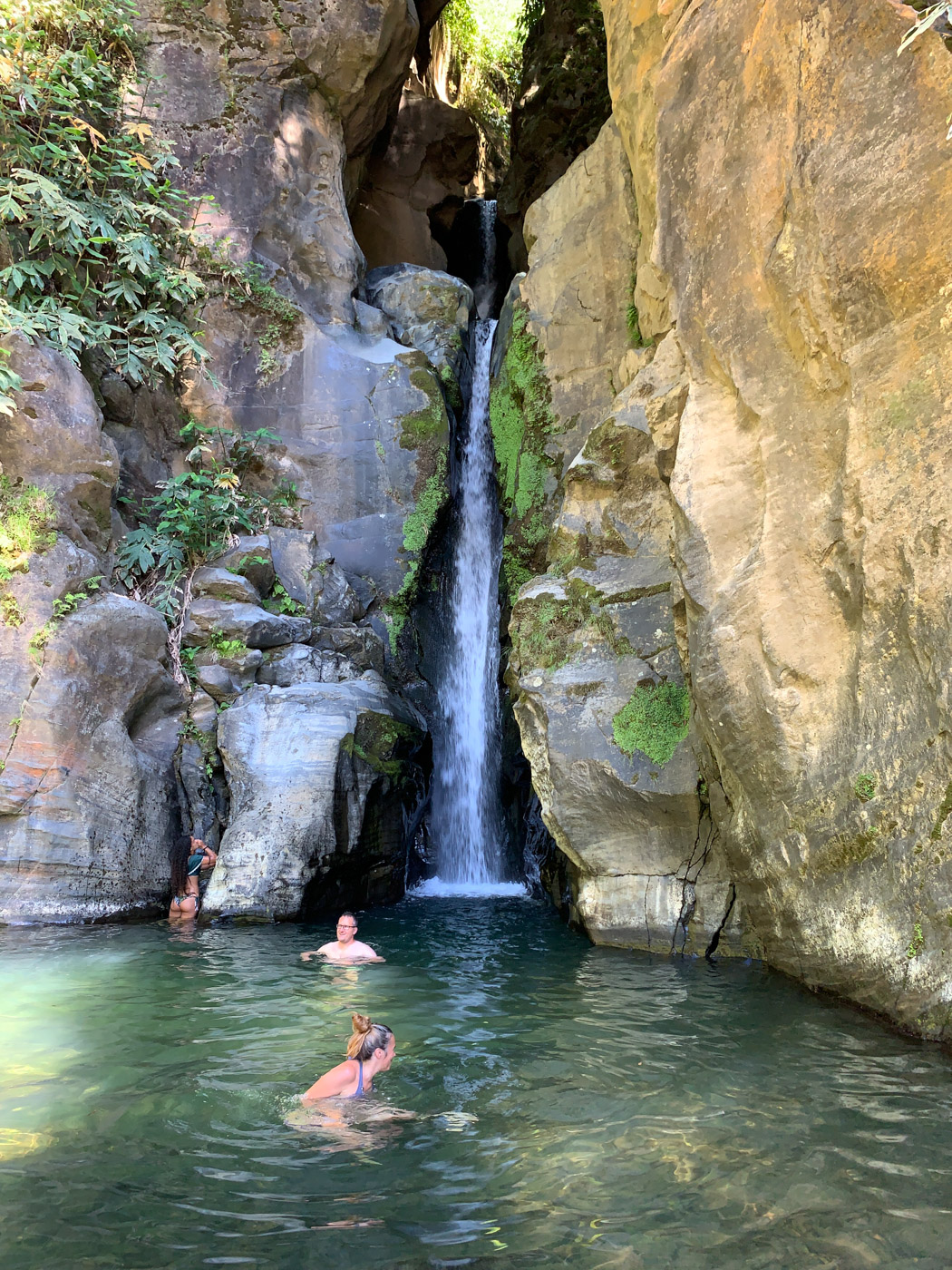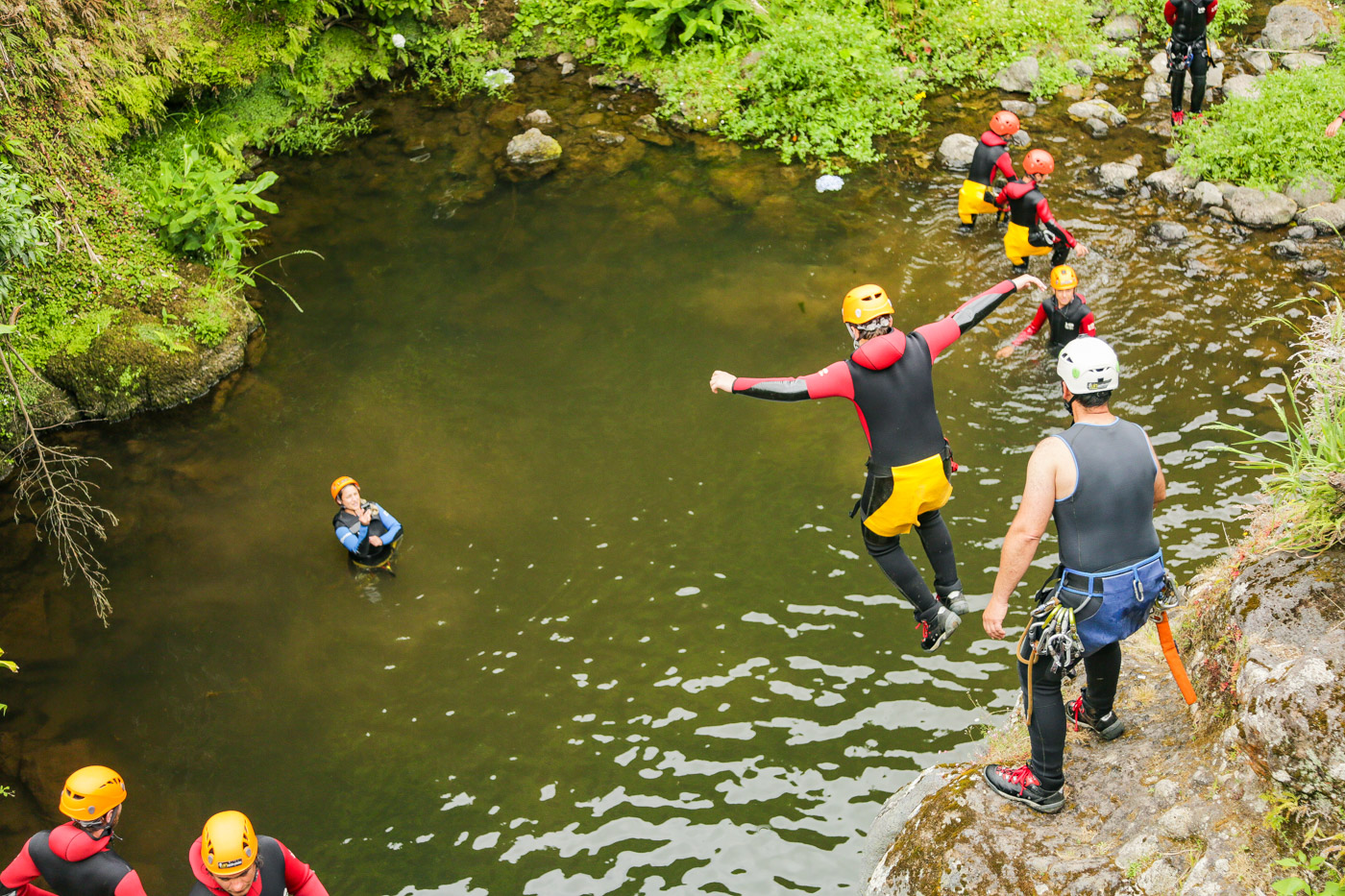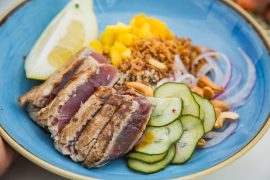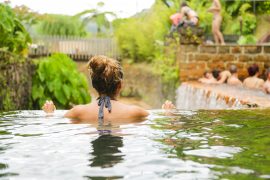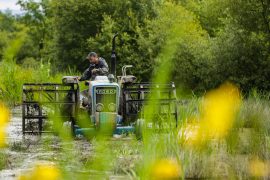São Miguel is one of the most visited islands in the Azores, and there are many reasons why that should be. The island has a variety of attractions, from volcanos, hot springs, hikes to sand beaches. Have a look below at some of the most beautiful places to visit in São Miguel and the things you should not miss to do, taste and experience when you go there:
1. Visit the city and capital Ponta Delgada
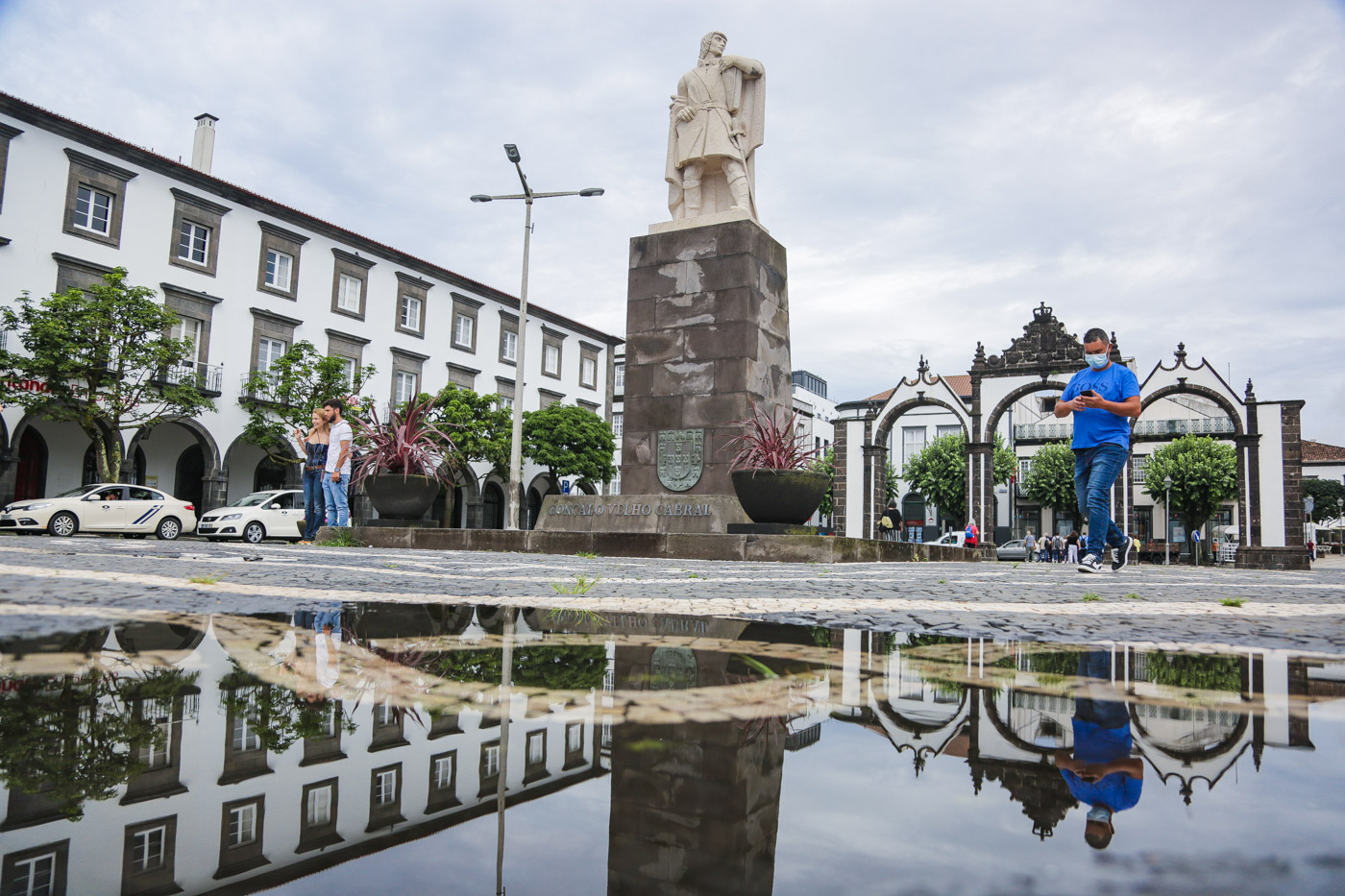
São Miguel is a lovely city, with many buildings of architectural interest. You should use the city as your base for a couple of days, nut you should also reserve a few days to stay in other villages on the island.
2. Enjoy some time at the Lagoa das Sete cidades
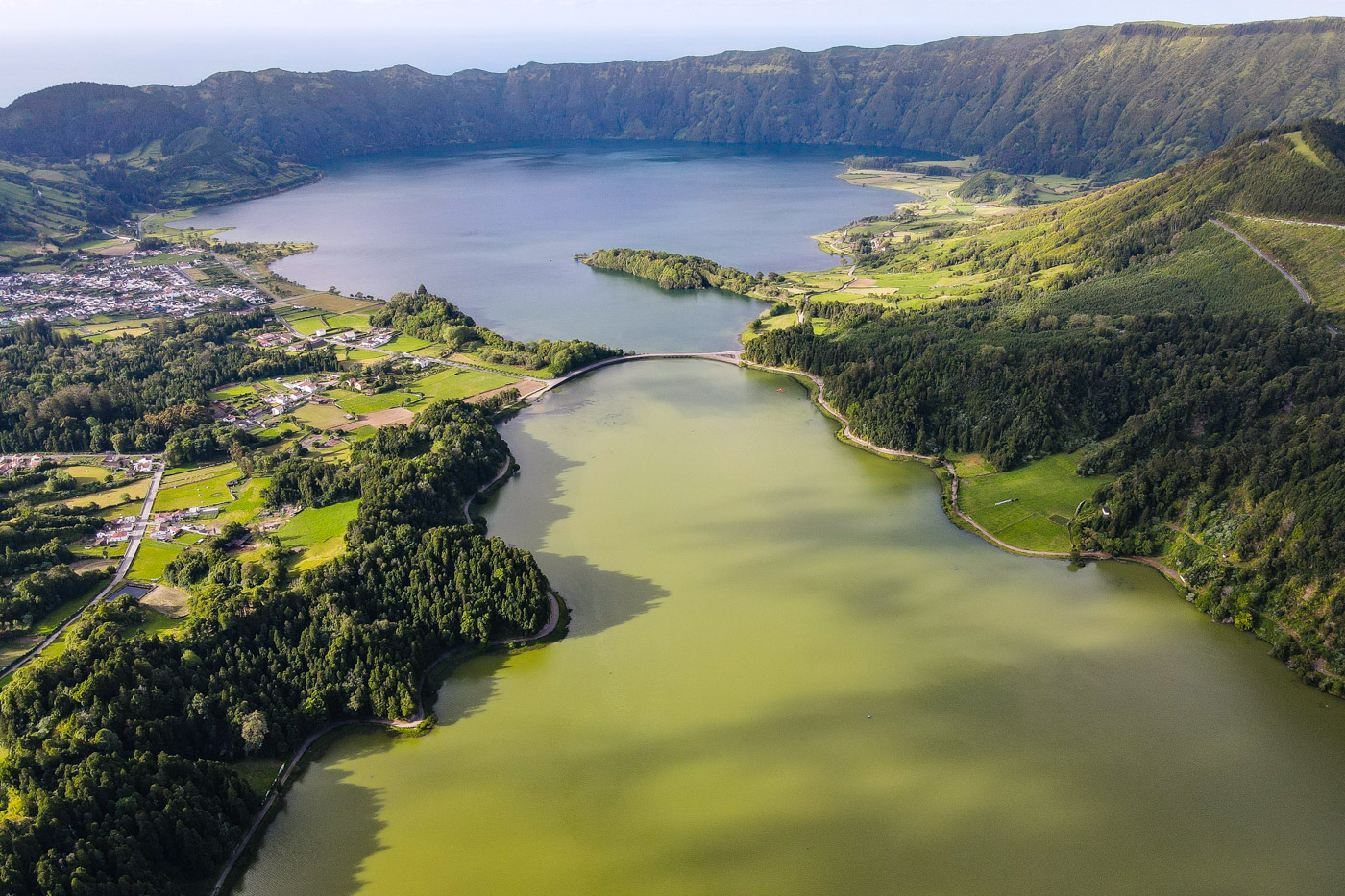
Sete Cidades is a tiny village located next to the Sete Cidades Lake. This lake is probably the most photographed in all of the archipelago. Lake Sete Cidades is often referred to as the Blue and the Green Lakes, although, hydrologically speaking, they are one sole lake.
3. Have a kayak tour at the Lagoa das Sete cidades
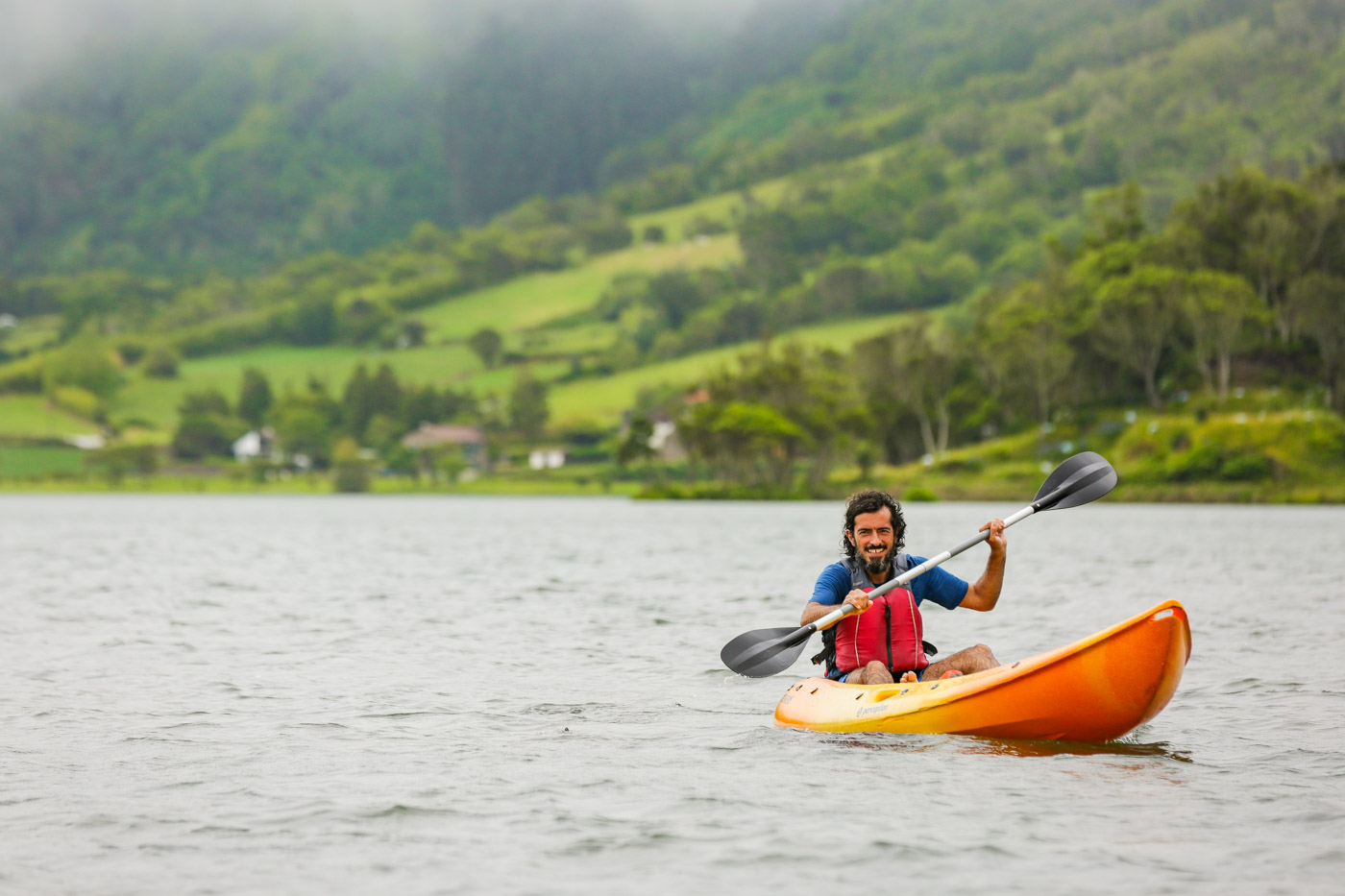
With such a beautiful natural location, there are many activities that can be done near the lake. Beside hikes or cycling around the lake, another favourite activity is kayaking in the lake. Renting a kayak or a stand-up paddle is possible, for an entire day of just for a few hours, and we were really happy that we had decided to spend enough time near the lake.
Tip: We rented a kayak and a stand-up paddle with Futurismo and can only recommend the experience.
4. Walk to the Boca do Inferno lookout
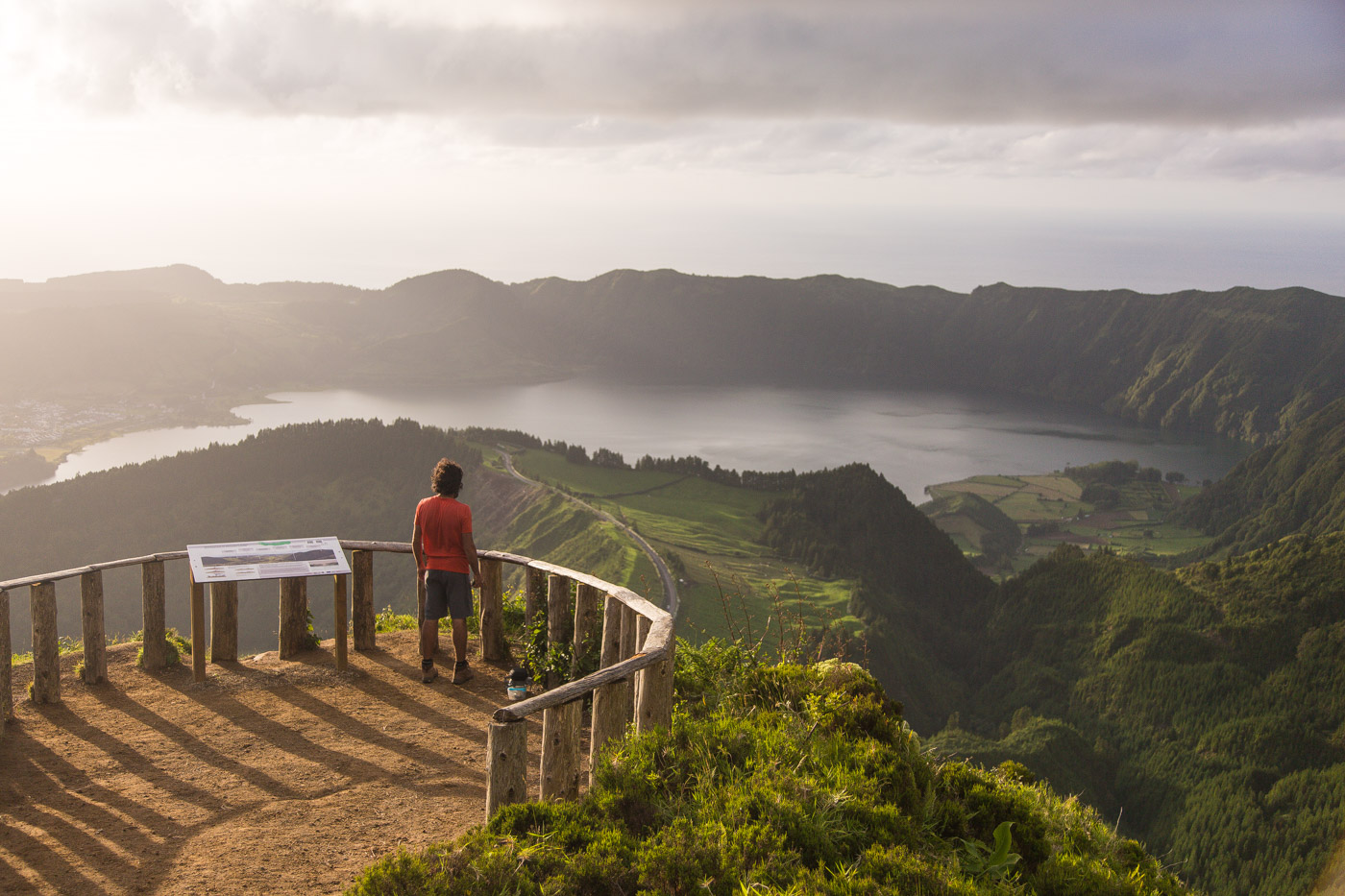
The Boca do Inferno lookout is one of the most beautiful in the Azores, with incredible views over the lakes. There’s a parking site next to the path that takes to the lookout. You will have to walk for about one kilometre through a lovely forest, and can even make a detour to another lake (Lagoa do Canário), which is also worth the views.
5. Go to the beach in Mosteiros
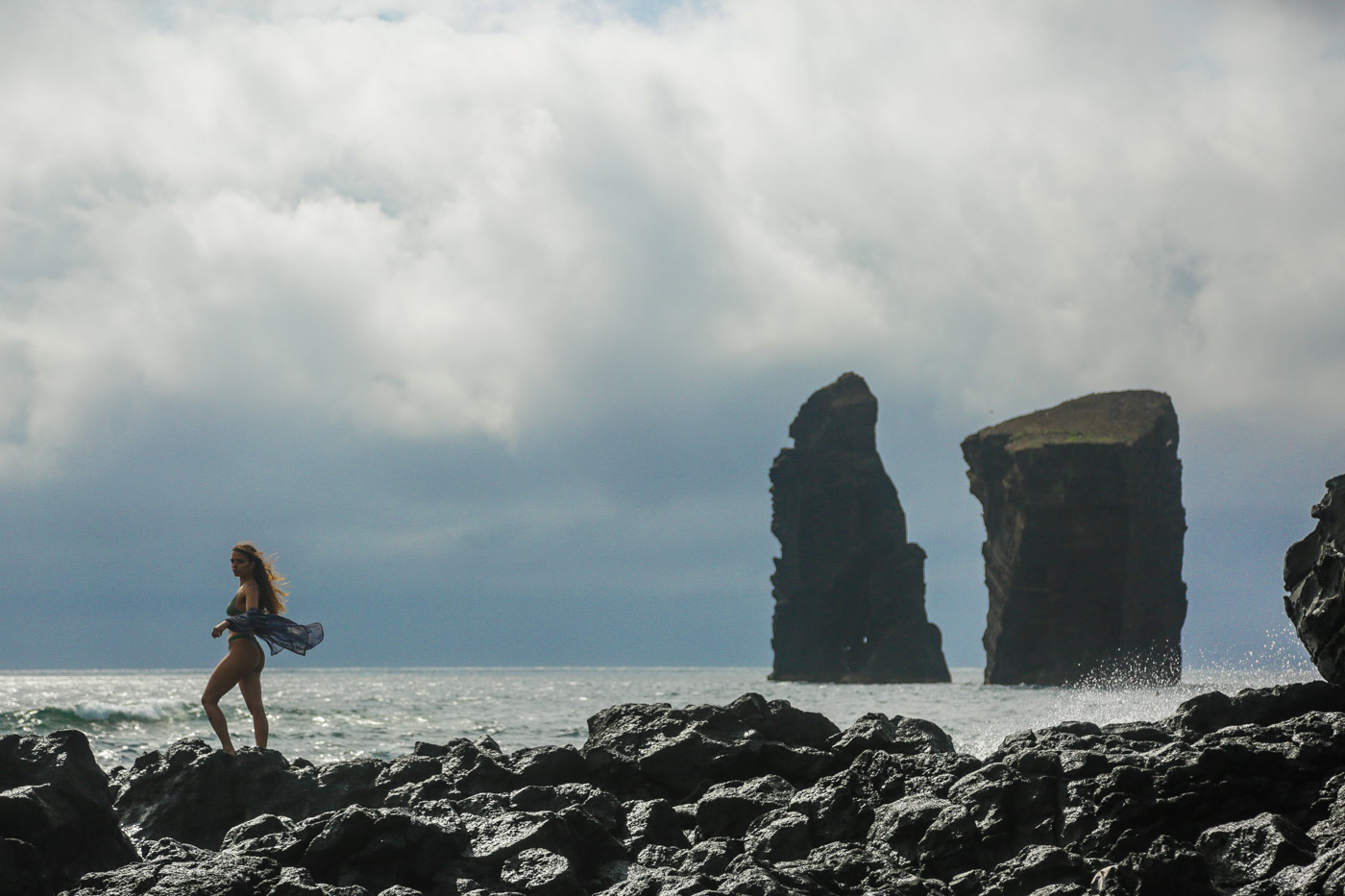
Mosteiros, on the western side of the island, has the feel of a forgotten village, being half asleep. Mosteiros’ landmarks are two slender islets off the coast; mysterious when enveloped in sea mist and very instagrammable.
6. Have a hot swim at the Ponta da Ferraria
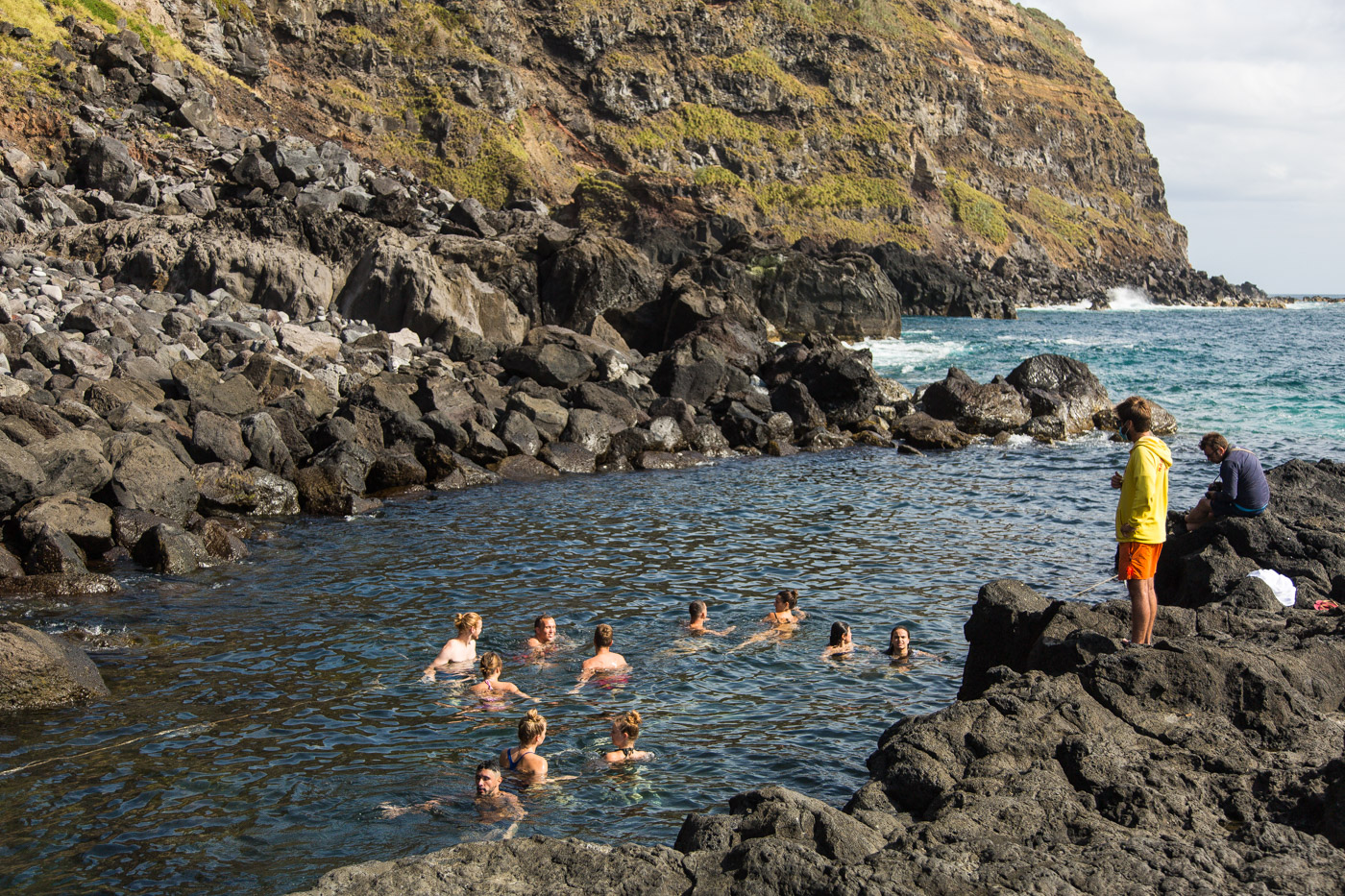
Close to Mosteiros, at Ponta da Ferraria, is yet another place with a hot water source. Here, the hot water squirts straight out of the sea! Most visitors come here to immerse themselves in these waters and to have therapeutic spa treatments.
Entrance fee: Entrance is free by the sea. There’s also a spa nearby (Thermal Spa Ferraria) with several swimming pools, jacuzzi and saunas.
7. Spend some days in the village of Furnas
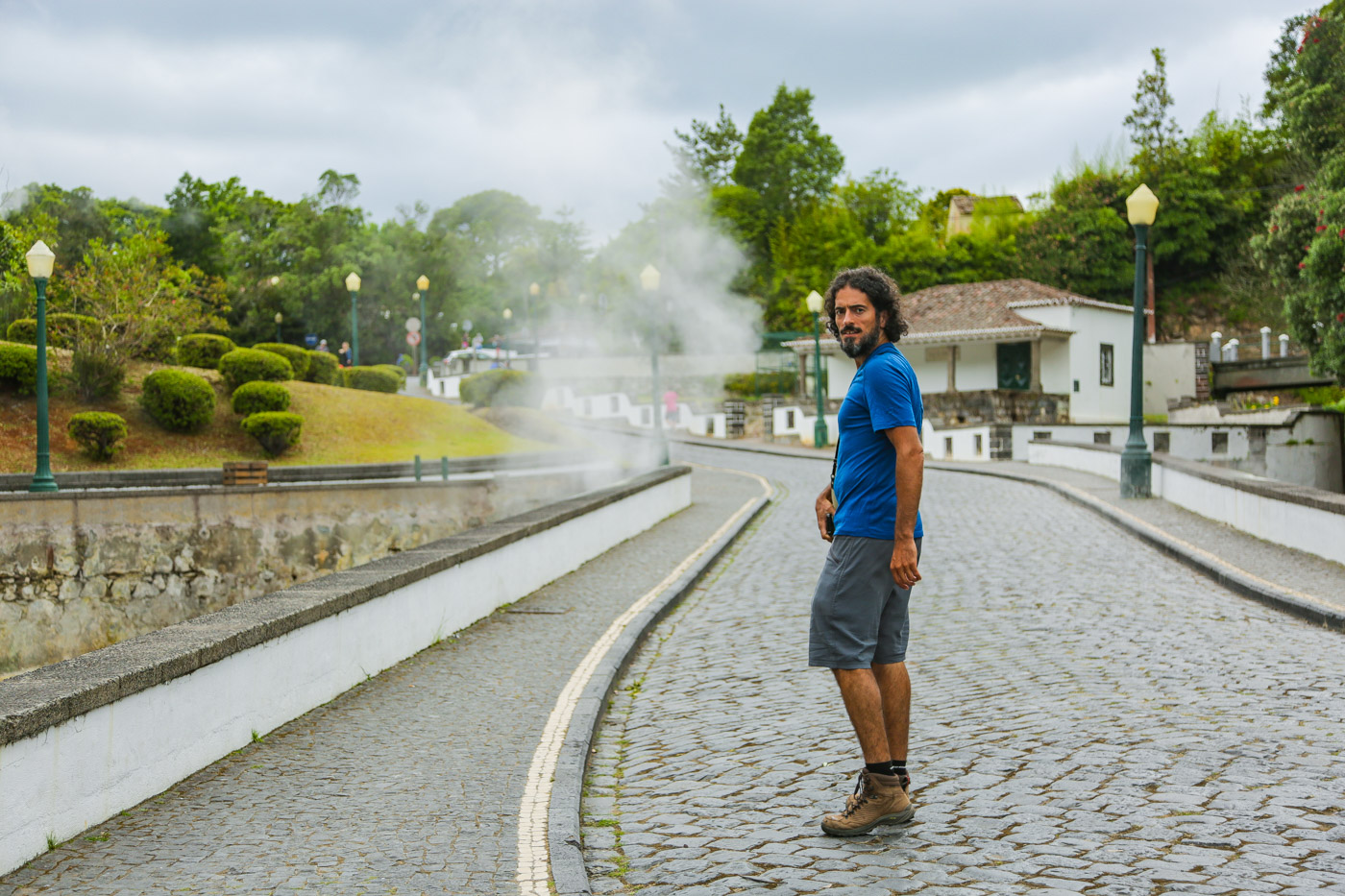
Furnas is a village with a high geothermal activity. Throughout the village there are numerous hot springs, bubbling cauldrons and mud pools. Locals believe that each of the springs in Furnas has different healing powers. Some treat hangovers, other gastritis or rheumatism. Don’t miss the cooked corn or the famous Cozido das Furnas.
8. Smell the Fumaroles in Furnas
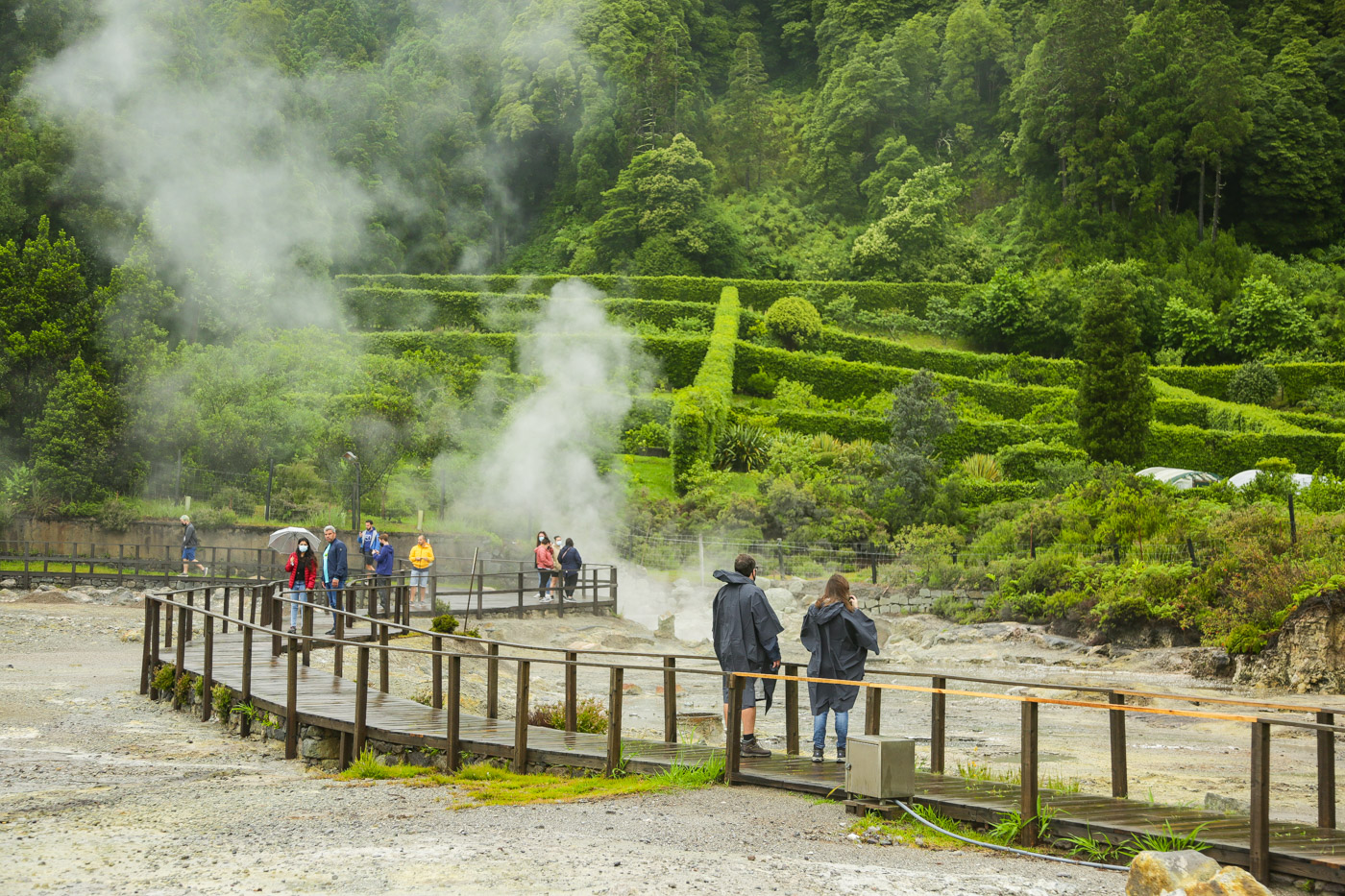
A bit outside the centre of the village of Furnas, next to the Furnas lake, there is an area with strong geological activity and therefore with many fumaroles. The smell of sulphur here is very intense too. This is the place where you will see people dig their cozidos. You too can rent a hole and put your food there to cook, provided that you bring your own ingredients in a pot.
Entrance fee: Free
9. Stop at the lookouts
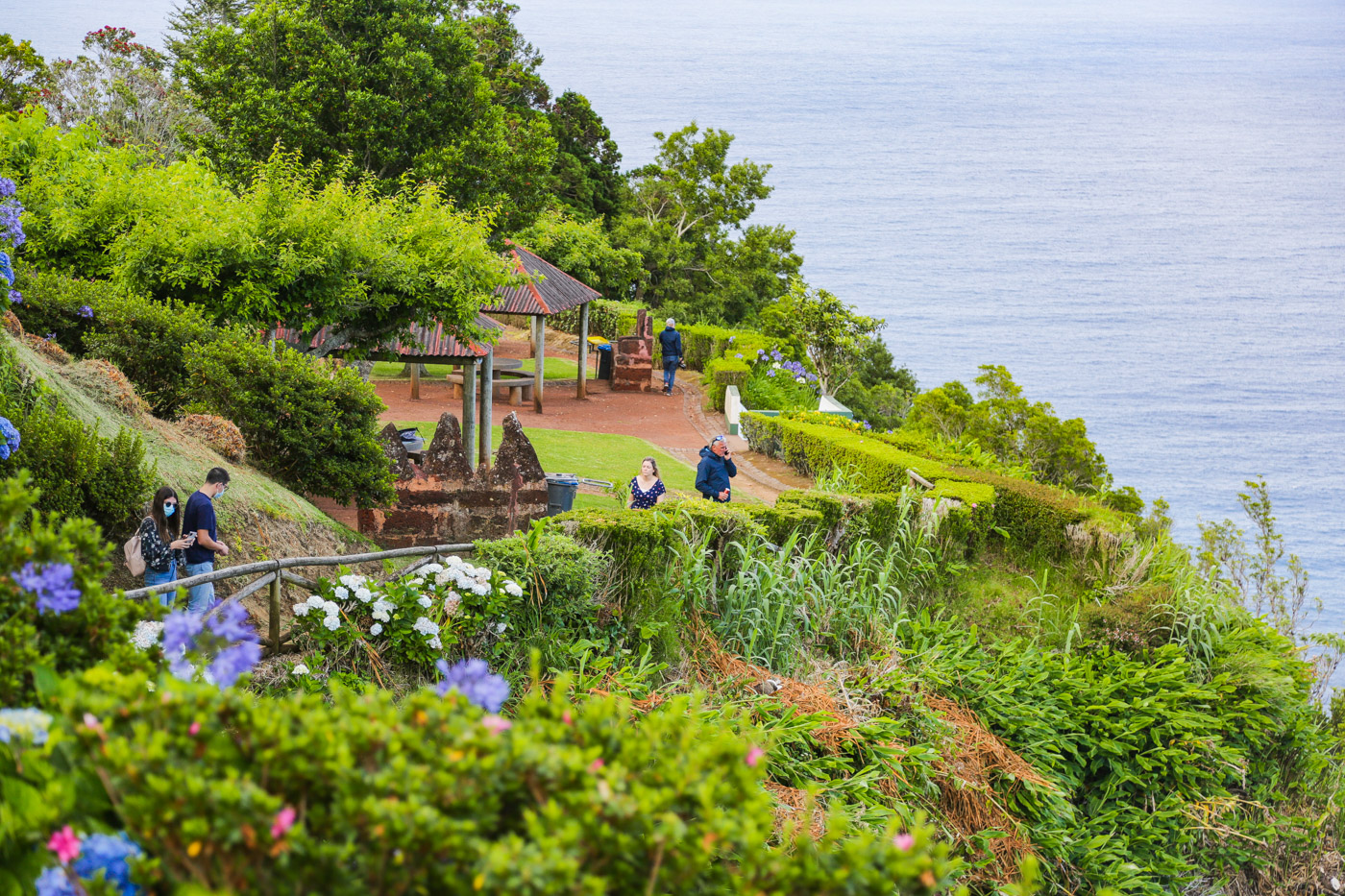
One of the highlights of São Miguel is to have a road trip and stop at the different lookouts. There are many lookouts with incredible views over the sea and the coast. This is enough as a tourist attraction for a day or two. Besides the views, the lookouts are beautiful places, almost like gardens with many flowers and places to sit and enjoy a relaxing moment.
10. Have incredible views over the Lagoa das Furnas at the Pico do Ferro lookout
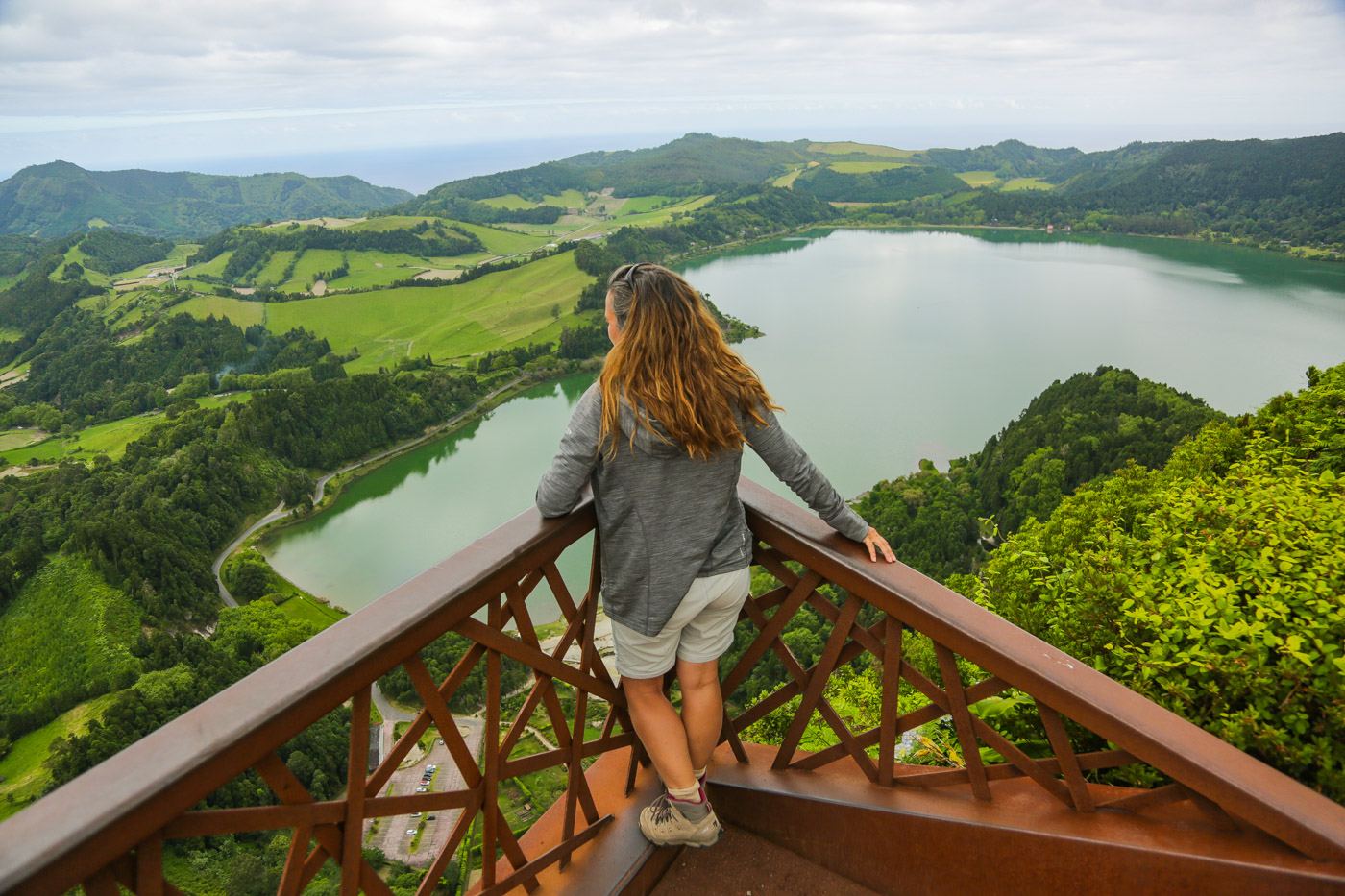
This is a beautiful lookout with views over the Lagoa das Furnas and the incredible green valley of Furnas. The lookout is also beautifully adorned wit hydrangeas, which makes an awesome contrast with the green of the lake and the forest all around.
11. See the chefs dig their cozidos in Furnas
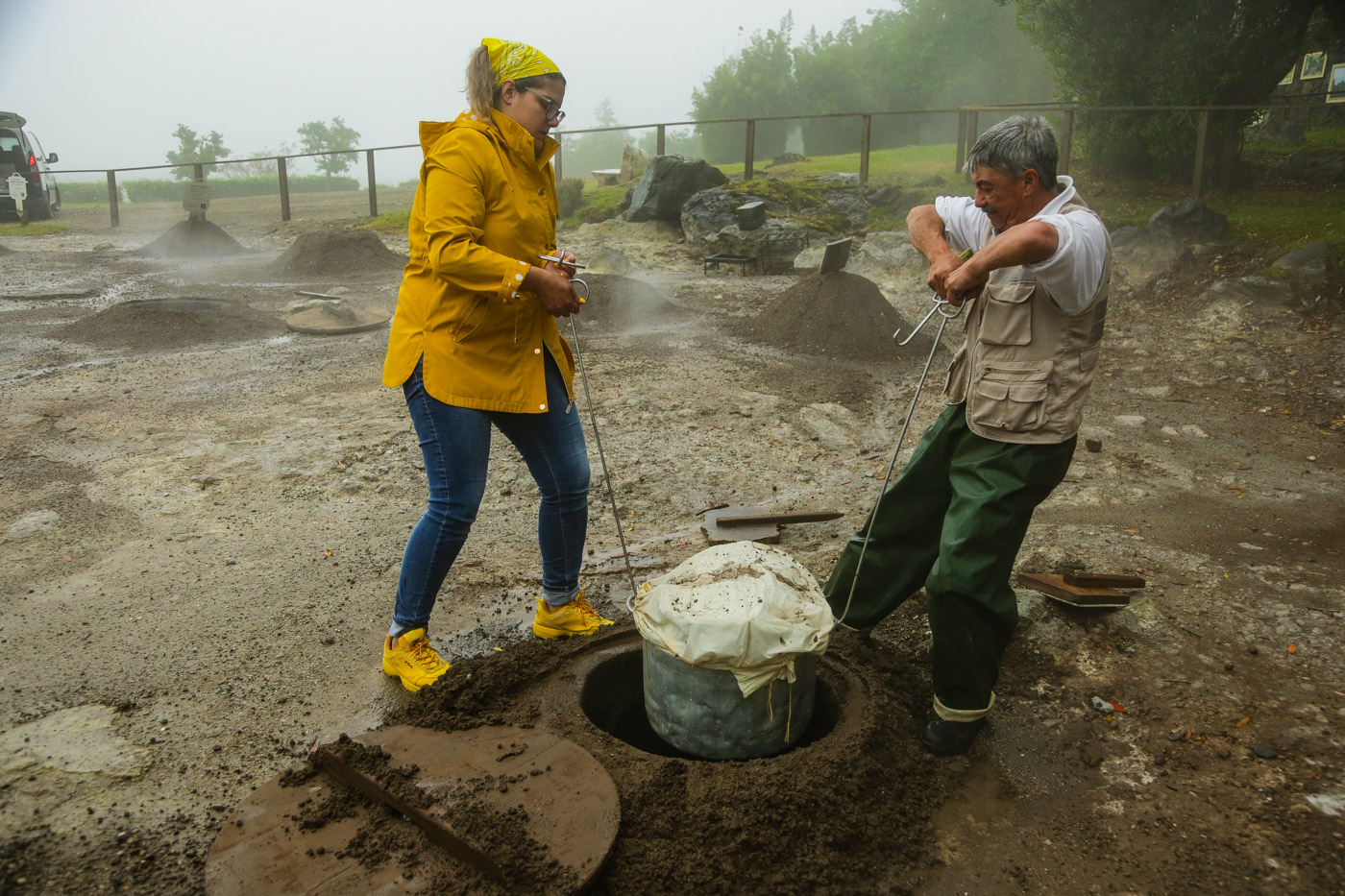
Chefs dig their cozido pots at around midnight to have the food ready to be taken out of the hot ground at around noon. Cozido is prepared overnight, because it takes a couple of hours for the pots to cook, slowly and with the heat of the natural fumaroles. Despite its not having any secret ingredients, it is a dish than can only be made on this island. The reason for that is that it requires active volcanic soil to cook.
12. Eat Cozido das Furnas
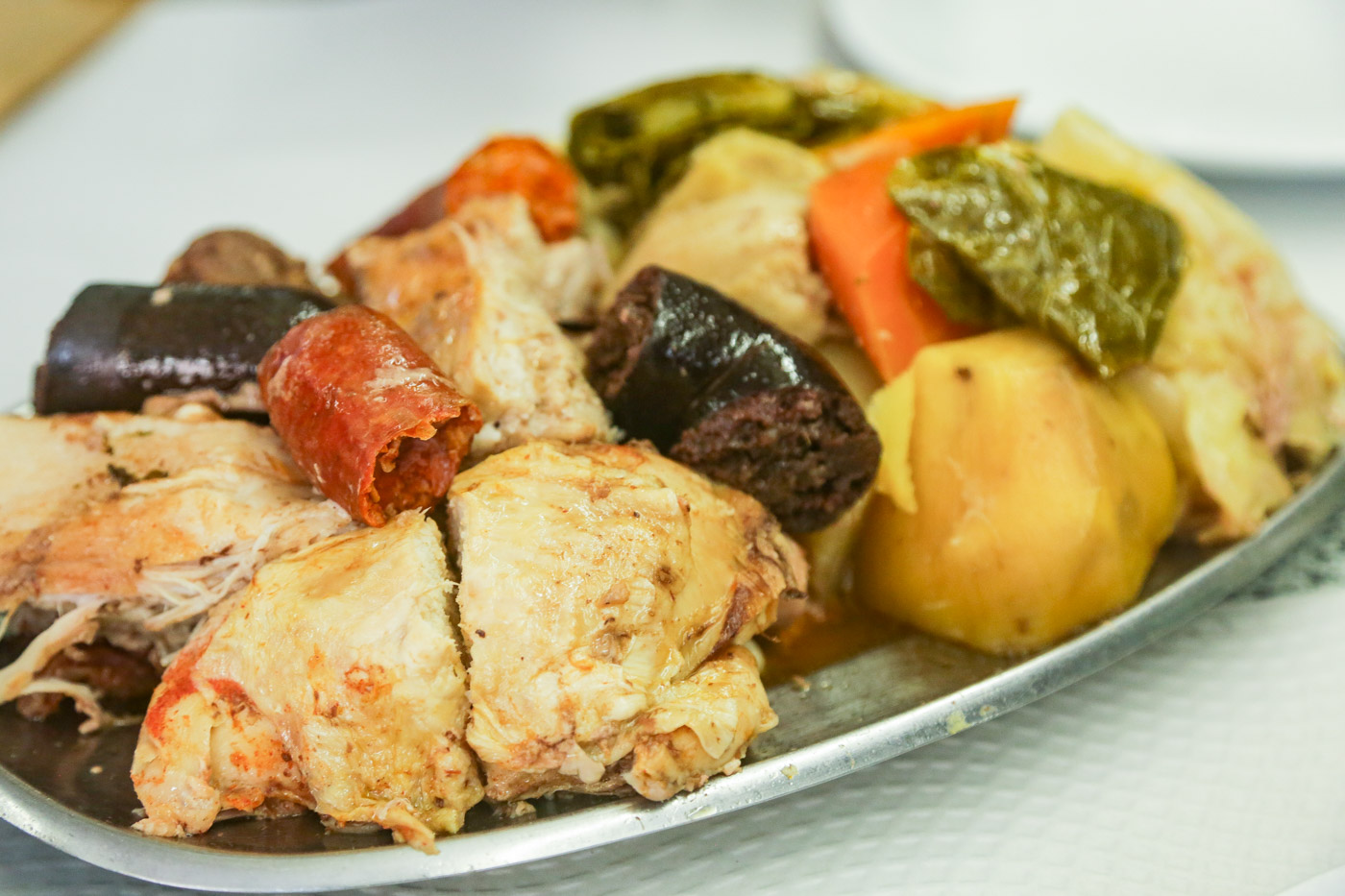
Cozido das Furnas is the signature dish of São Miguel. If you wish to do it yourself, when in Furnas, just buy the ingredients and put your own pot in a hole in the ground where the fumaroles are. Once served, you will get a generous portion of chicken, pork, beef, or sausages, as well as potatoes, carrots, cabbage and kale. The broth from the cooking also comes to the table and this extra juice makes all the difference.
13. Spend a relaxing afternoon at Poça Dona Beija
This complex has five thermal pools, each with different water temperatures (from 25 to 39 degrees Celsius). Their pools also vary in depth, with some being merely 30 cm deep and others 130 cm. This complex is probably the cosiest of all, as the pools are at different levels, with the ones above offering visibility over the others. Dona Beija remains open until late at night, which creates a special atmosphere, with lights illuminating the yard and the pools in the darkness.
Entrance fee: 6 EUR (4 EUR for children below six)
Opening hours: Open every day from 10 am to 11 pm (last admission at 10.30 pm)
14. Visit the Terra Nostra Garden
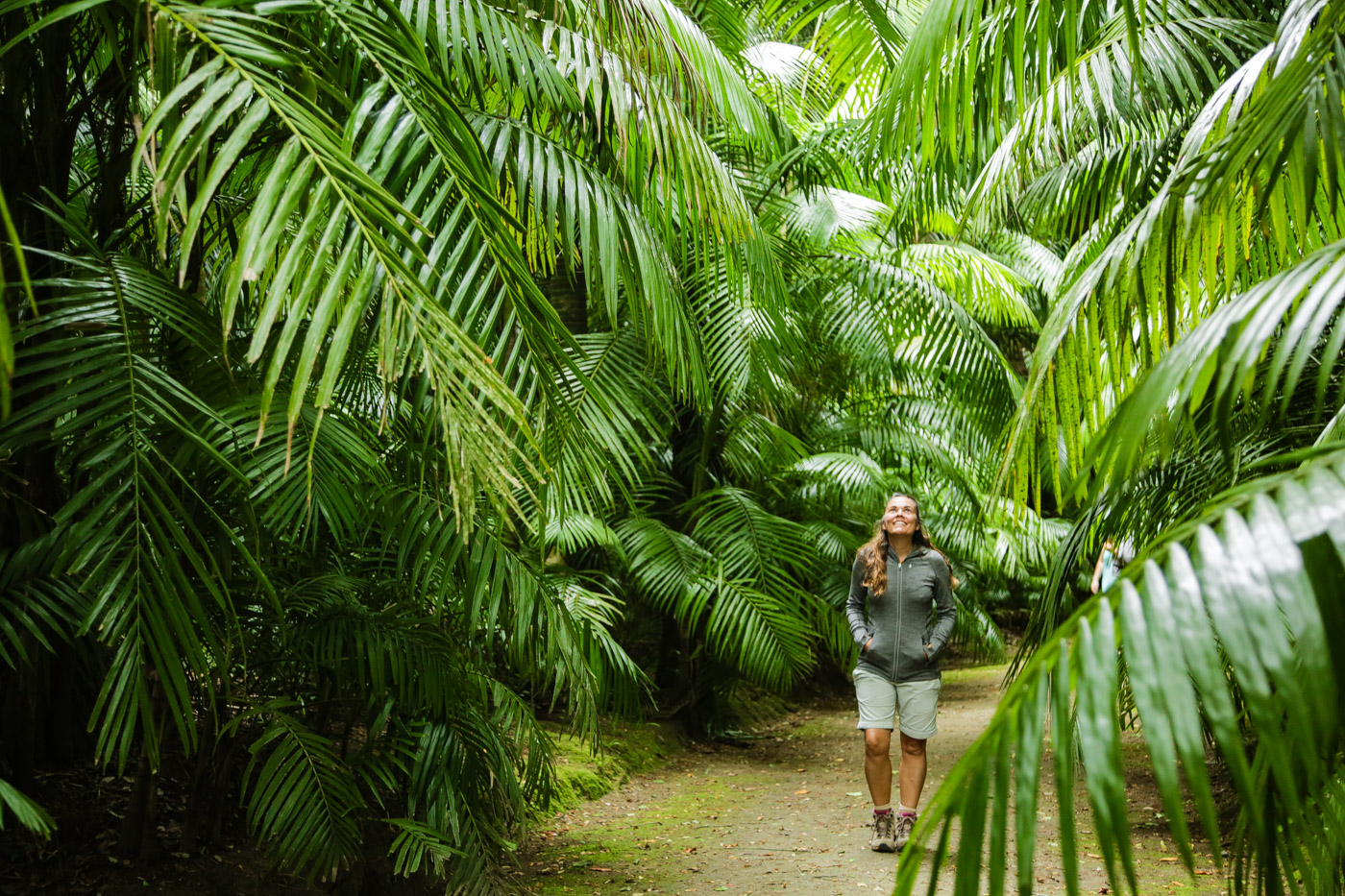
It all started in 1775 when an American Consul, Thomas Hickling, decided to build a summer house and garden. Since then, the property has passed through different hands, each owner adding something new (a new house, a new flower bed, a new water pool, more land, or many new species, imported from all over the world). Nowadays, the garden is one of the most beautiful in the Azores, and one of the most beautiful we have ever visited. In the mid 20th century, the entire property was acquired by the Terra Nostra Company, and is managed by the Bensaude family, who renovated and expanded the park to what it is today.
Entrance fee: 8 EUR
Opening hours: Open from 10.30 am to 4.30 pm
15. Enjoy the Caldeira Velha waterfall and hot springs
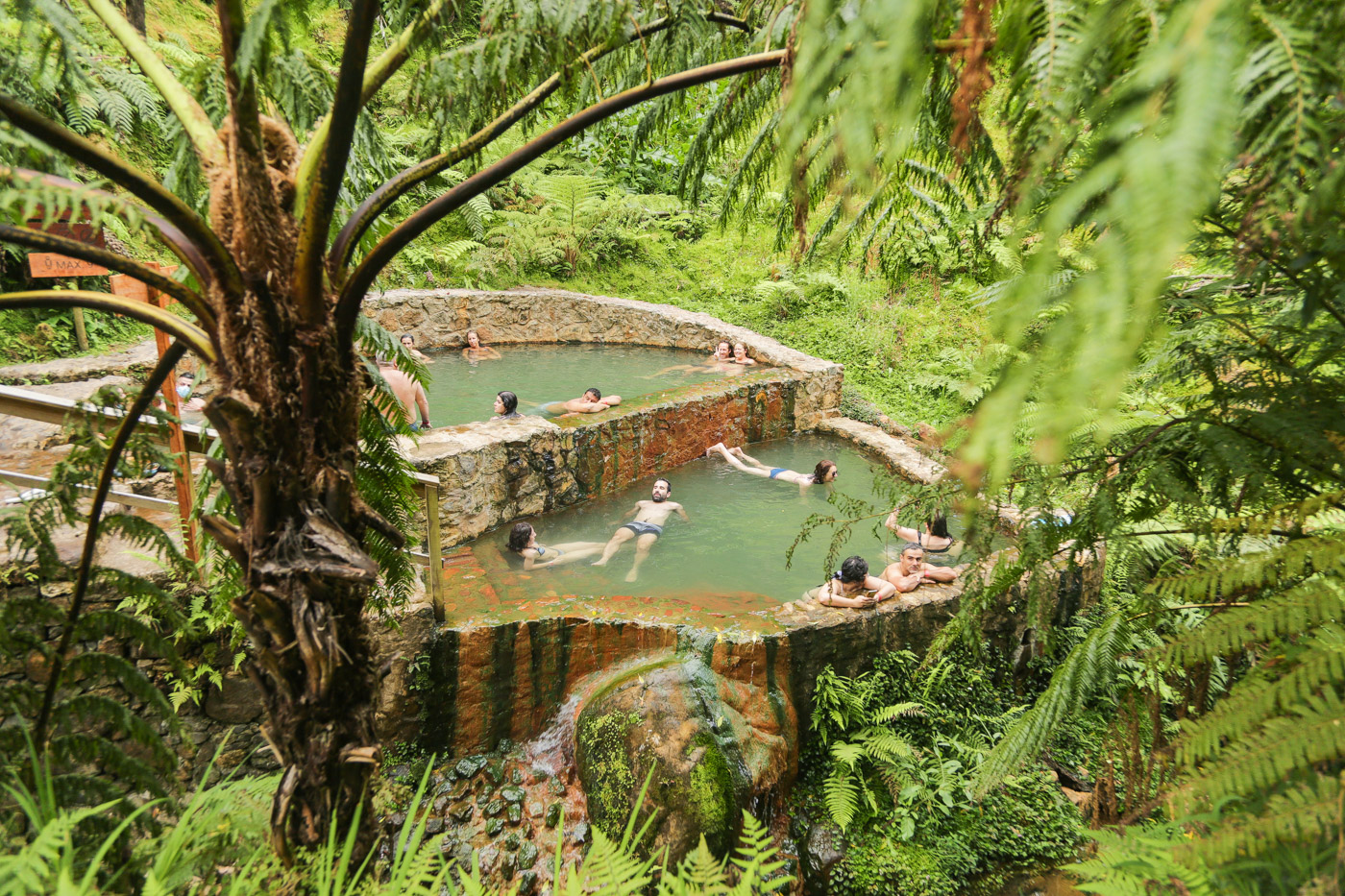
The Caldeira Velha is probably the most idyllic of the hot springs in Furnas. Its first and most imposing pool is fed by a waterfall, and seems a sight from the Garden of Eden. The water here is more refreshing than hot, therefore this one is skipped more quickly than it deserves to be. Caldeira Velha also has two smaller pools, where the water is hotter and, once again, these are surrounded by lush vegetation, and particularly huge versions of ferns.
Entrance fee: 8 EUR
Opening hours: From October to April (9.30 am to 5.30 pm;
from May to September (9.30 am to 8.30 pm)
16. Find out about the Gorreana Tea Plantations
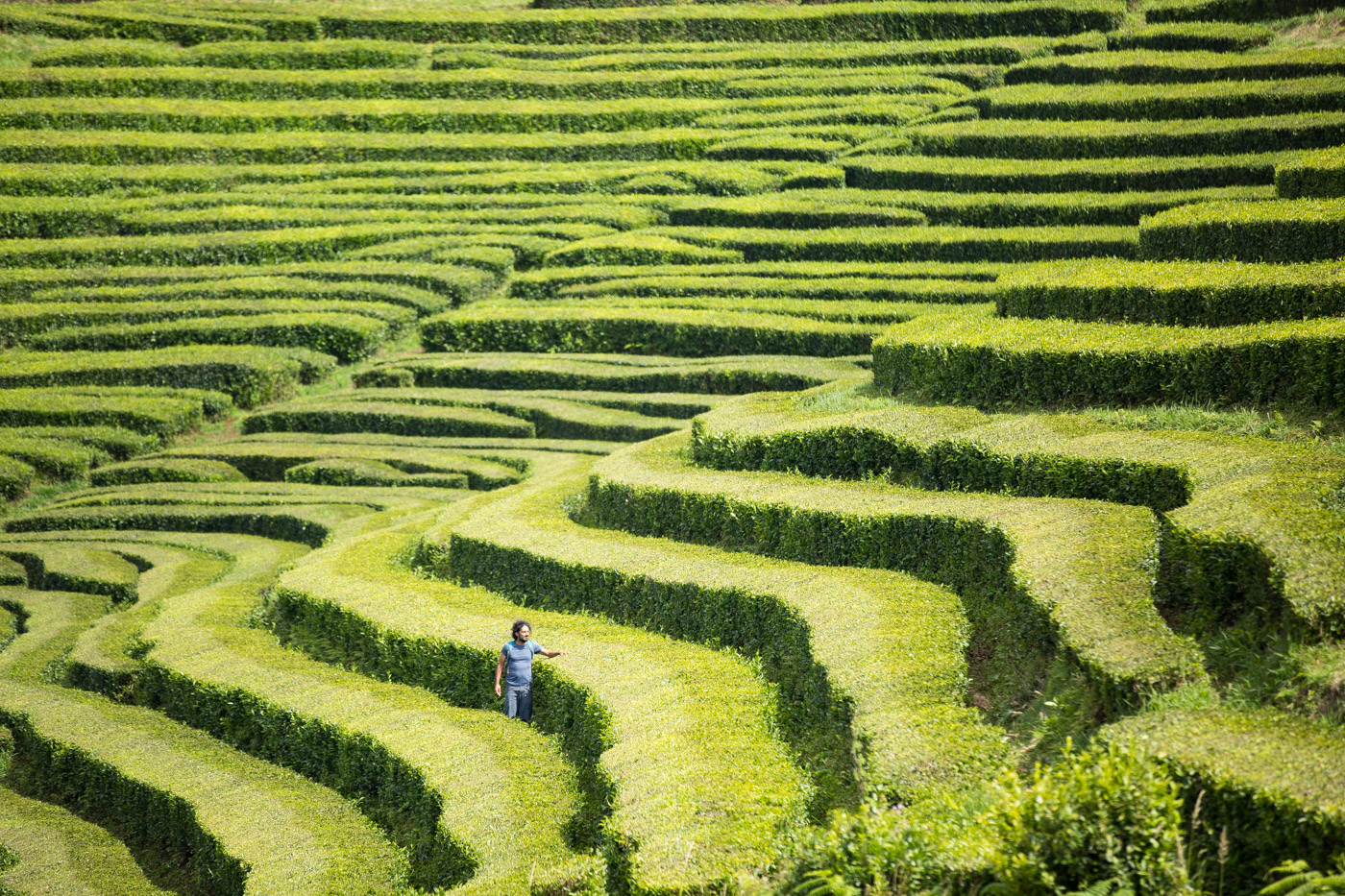
The Azores is home to the oldest tea plantations in Europe. Gorreana and Porto Formoso are the two centenary tea factories on the island of São Miguel, whose teas are recognised as world class products. They pride themselves in having handpicked leaves; all grown without the use of any pesticides or preservatives. This is possible because tea plagues do not survive in the island’s climate.
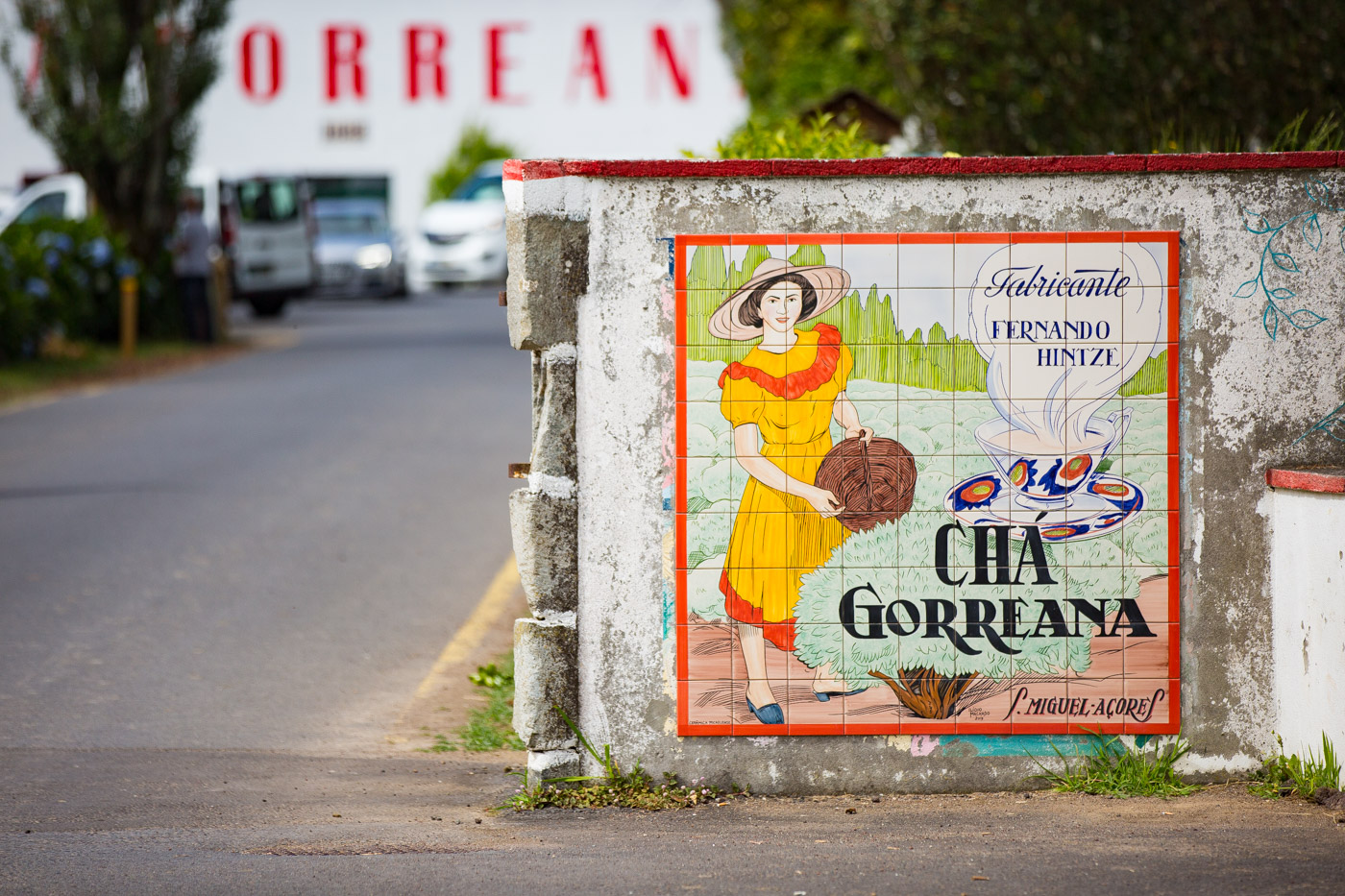
All tea derives from the leaves of Camellia Sinensis. Varieties in taste and aroma depend on the selection of leaves, the process involved in drying the leaves, the soil’s pH level, the climate and even the altitude. What sets Azorean tea apart is the drying phase, which is done in the open air, near the salty sea.
Entrance fee: Free entrance
17. Try the pineapple produced on the island
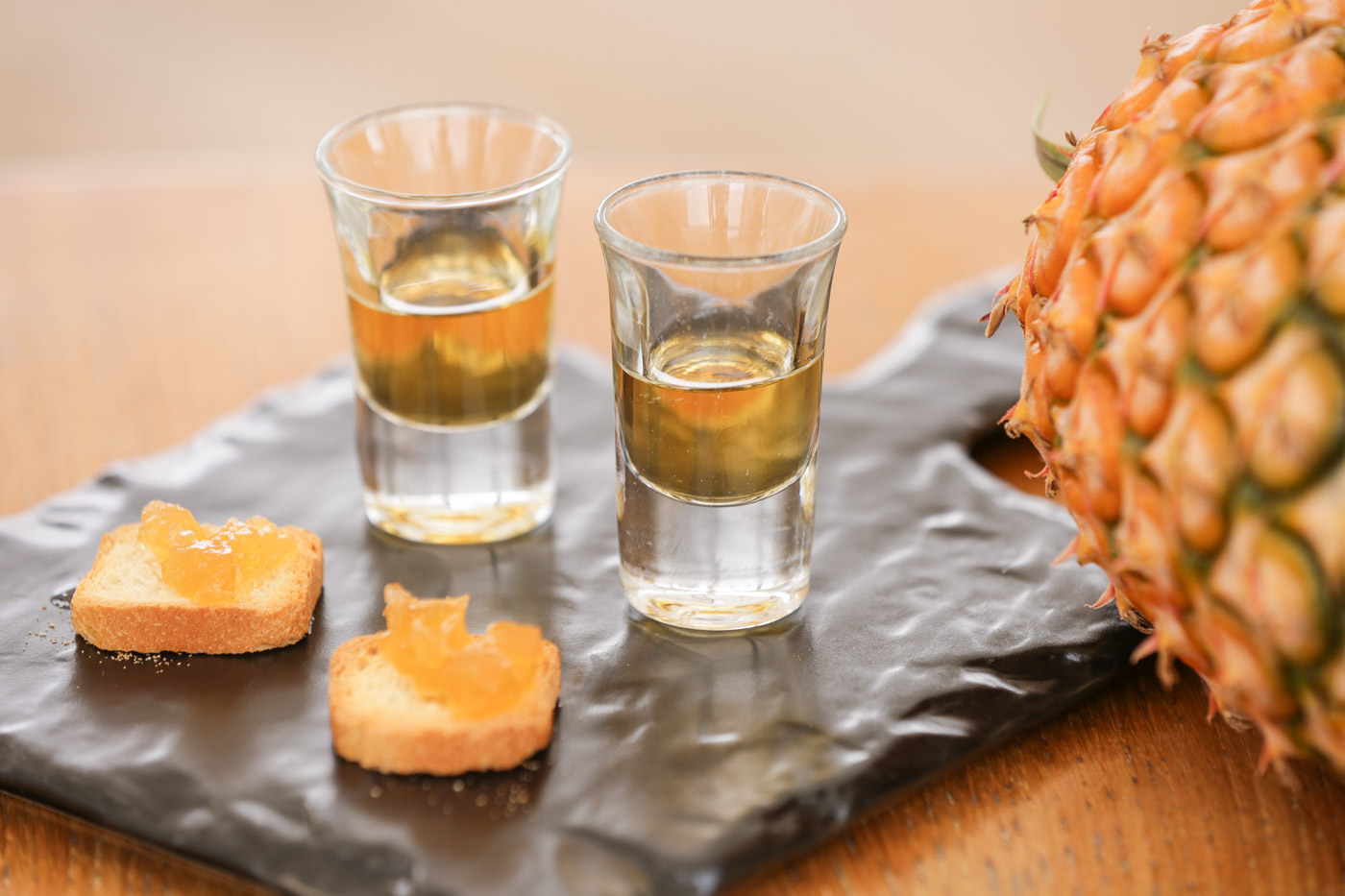
The Portuguese brought the pineapple from Brazil to São Miguel in the XIXth century, but used it first as an ornamental plant. Later they discovered that the fruit was actually delicious and its growth could replace the production of oranges, which had been devastated by gummosis, a fungal disease.
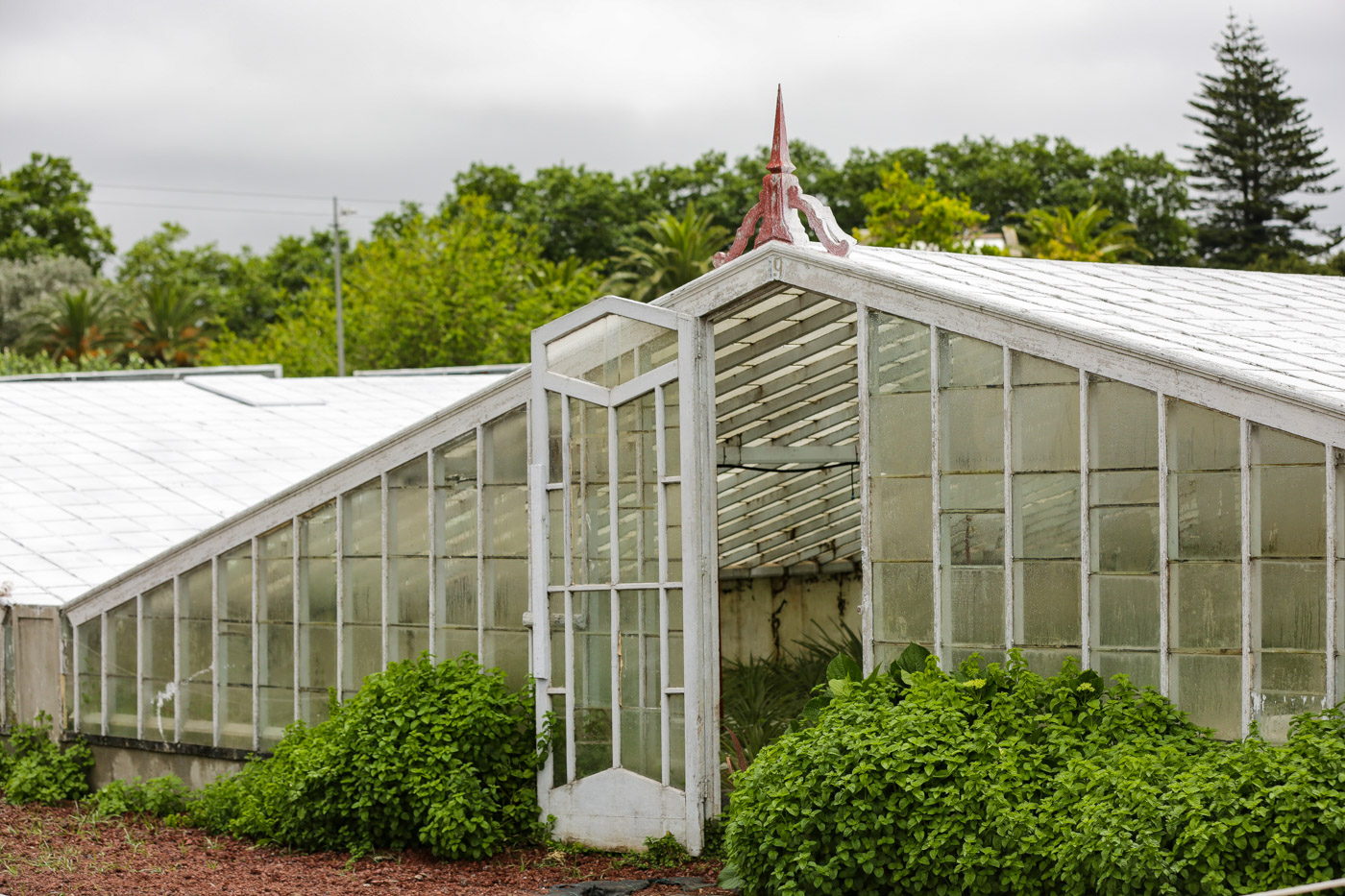
In the early 20th century the island was already exporting pineapple to Europe, Russia and the US. Each year the island produces circa 700 to 1,000 tons of pineapples. And you will also find other products made with pineapple, such as jam and liqueur.
Entrance fee: free entrance
18. Have a cetaceans watching tour
Travellers are heading to the Azores for many reasons, and one of them is because the Azores is a hotspot for whale watching. Besides the various species of whales to see, there are other cetaceans that can be observed off shore, such as orcas and several species of dolphins, and even turtles.
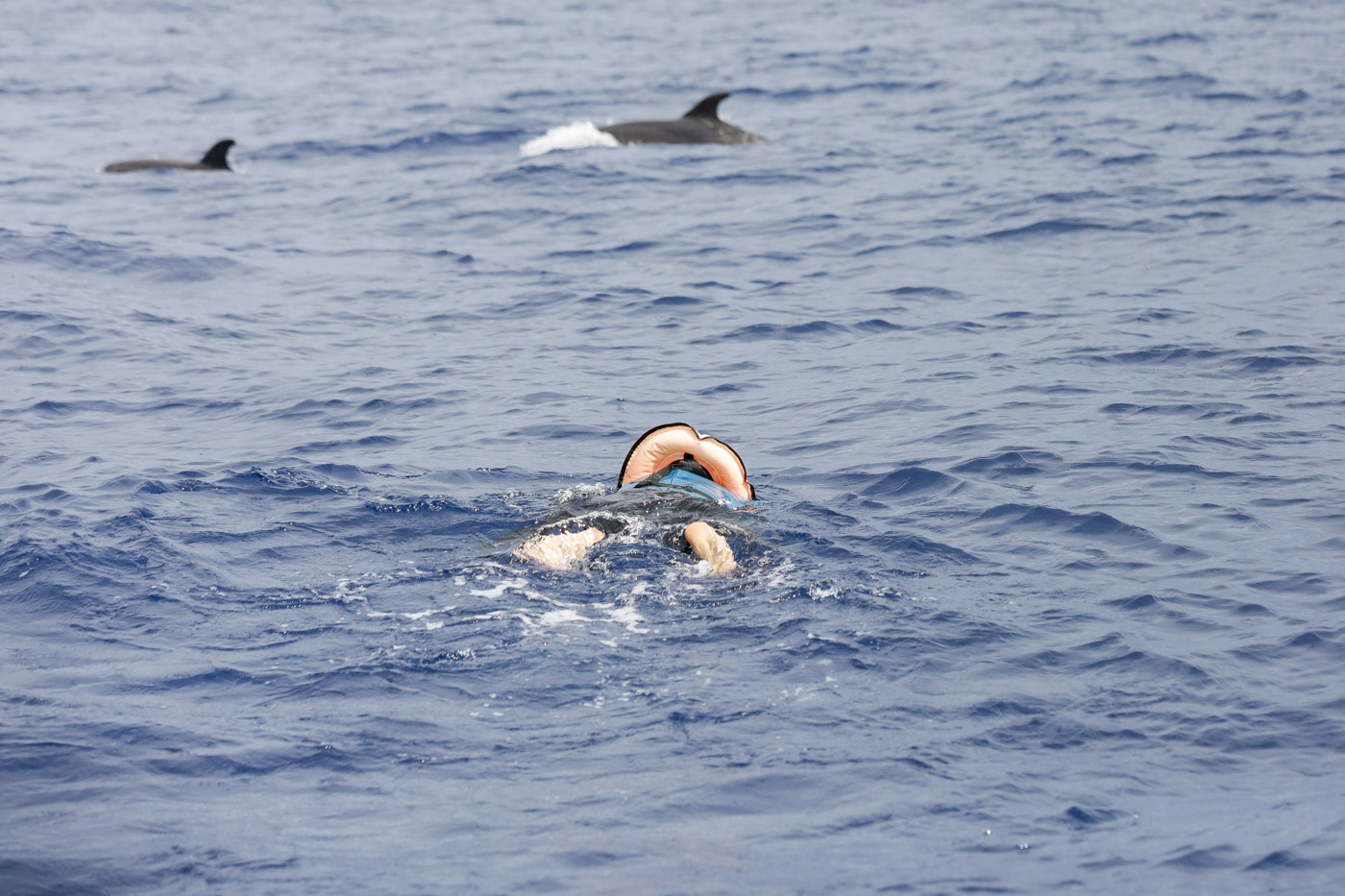
You can also go on an excursion to see the dolphins while you yourself are swimming near them. This is also a unique experience, though, we only advise it to people who can cope with the rough sea. It is not easy on the stomach to swim in the open sea…
Tip: We went on a cetaceans watching tour and we had a ‘swimming with the dolphins’ tour with Futurismo and can only recommend the experience.
19. Hike to Lagoa do Fogo
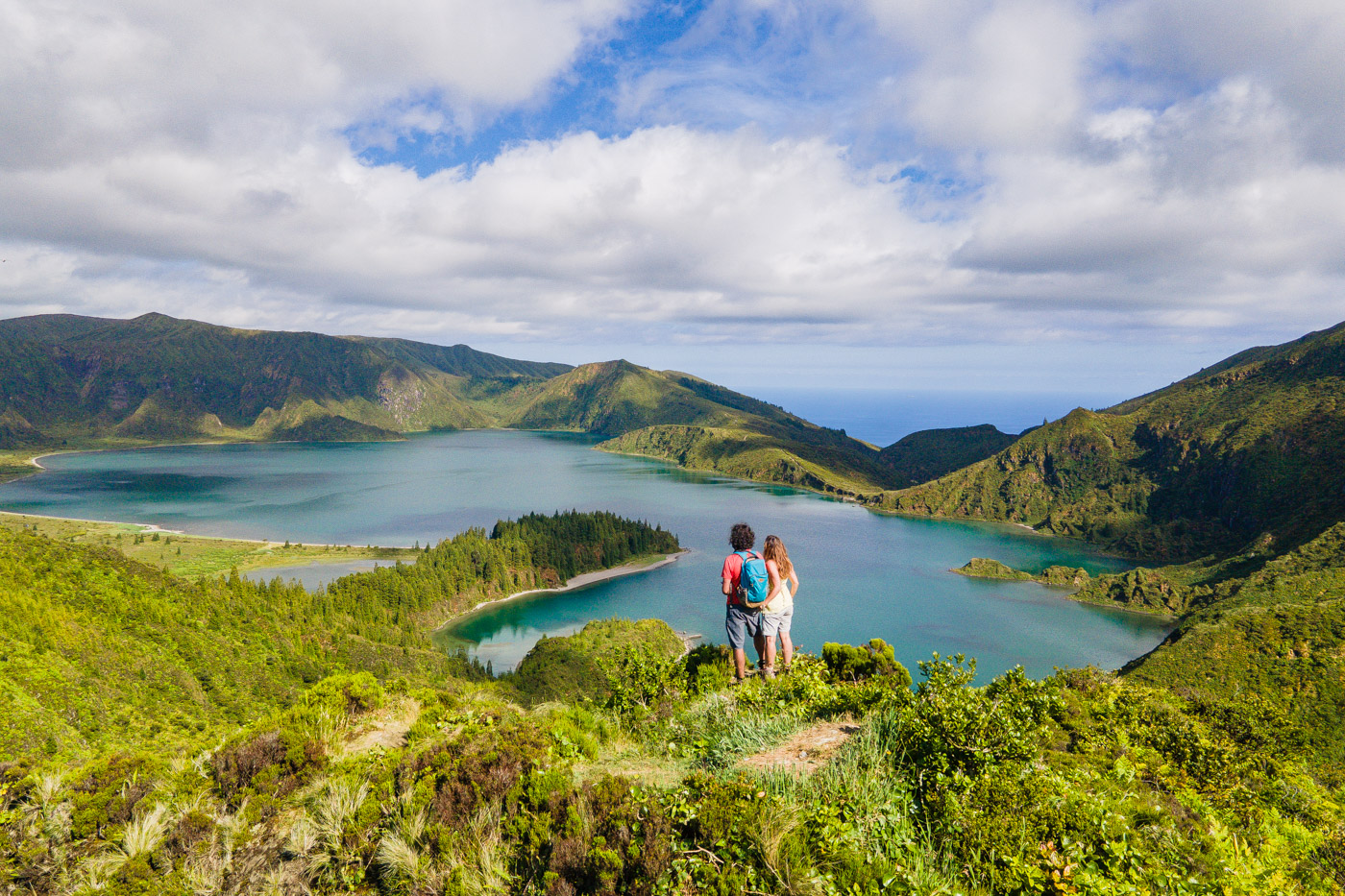
We drove to the middle of the island, for a walk around the Lagoa do Fogo (Fire Lake). We left the car in the parking lot, next to the lookout for the lake. From there we started our descent, on a narrow trail, amid the vegetation that was densely overgrown and very green. In less than one hour we had made it to the margin, from where we had excellent views over the entire lake and the surrounding slopes.
20. Spend some days in Ribeira Grande
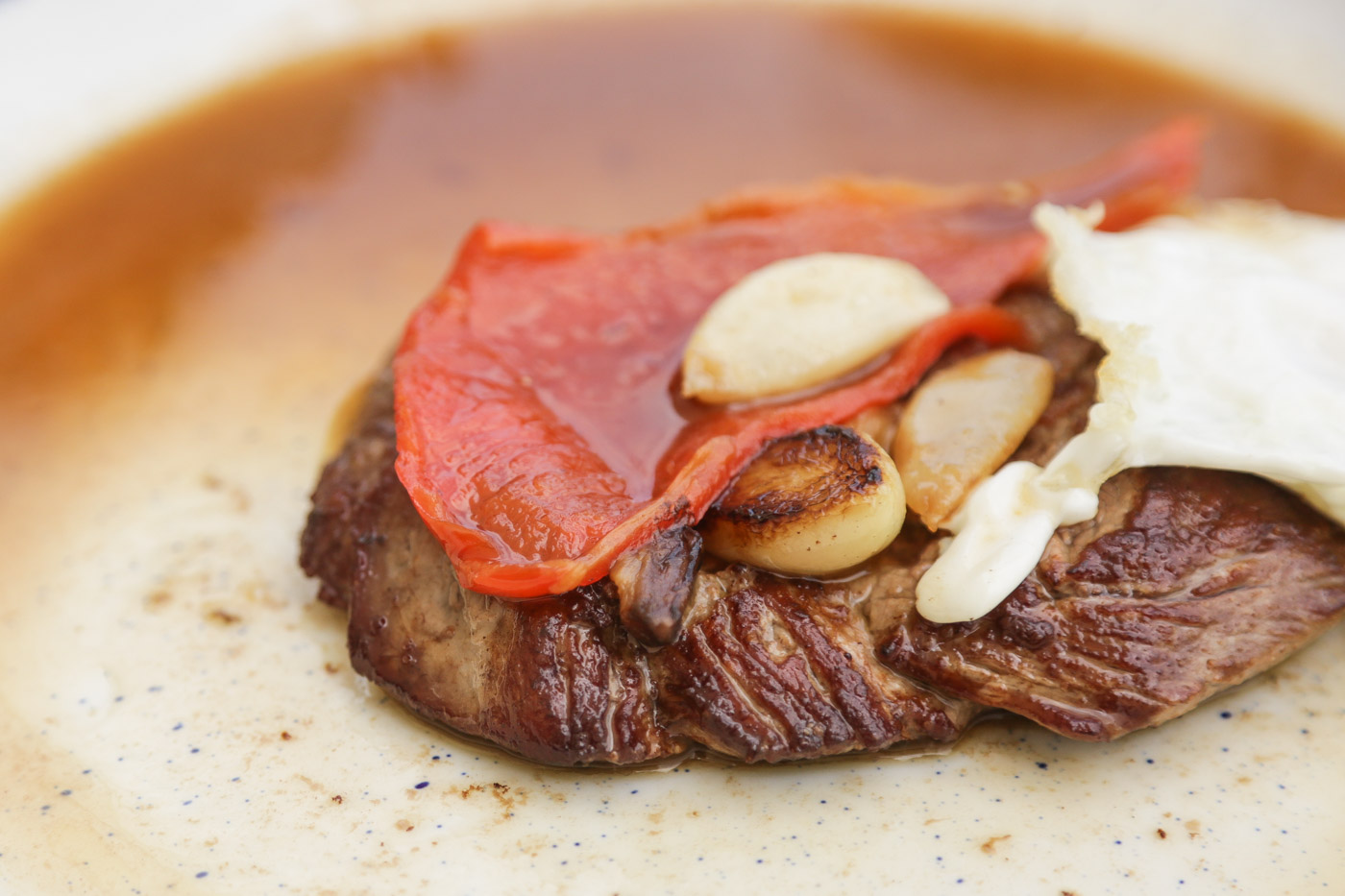
In Ribeira Grande, we had to try the beef steak at the Associação, renowned throughout the archipelago. So many people recommended it to us, even on other islands, and although we are not big meat eaters, we were not disappointed!
21. Smell the hydrangeas
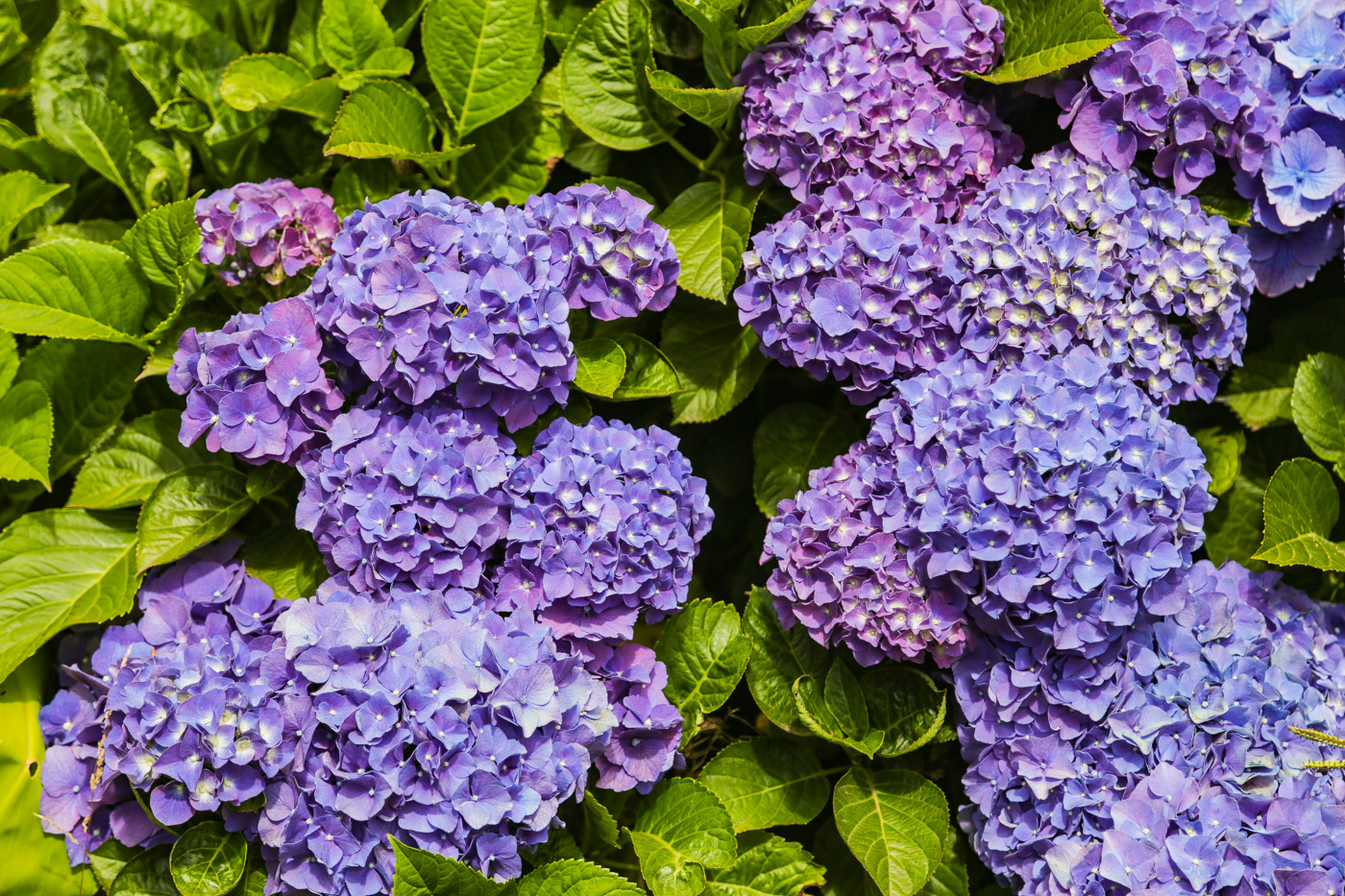
The hydrangeas are very popular throughout the different islands of the archipelago of the Azores. They blossom from May to August and it really is a highlight of the islands. They have been used in the fields as hedges to separate different fields, since they are easier to plant than building walls and cows don’t eat them.
22. Swim at the Salto do Cabrito Waterfall
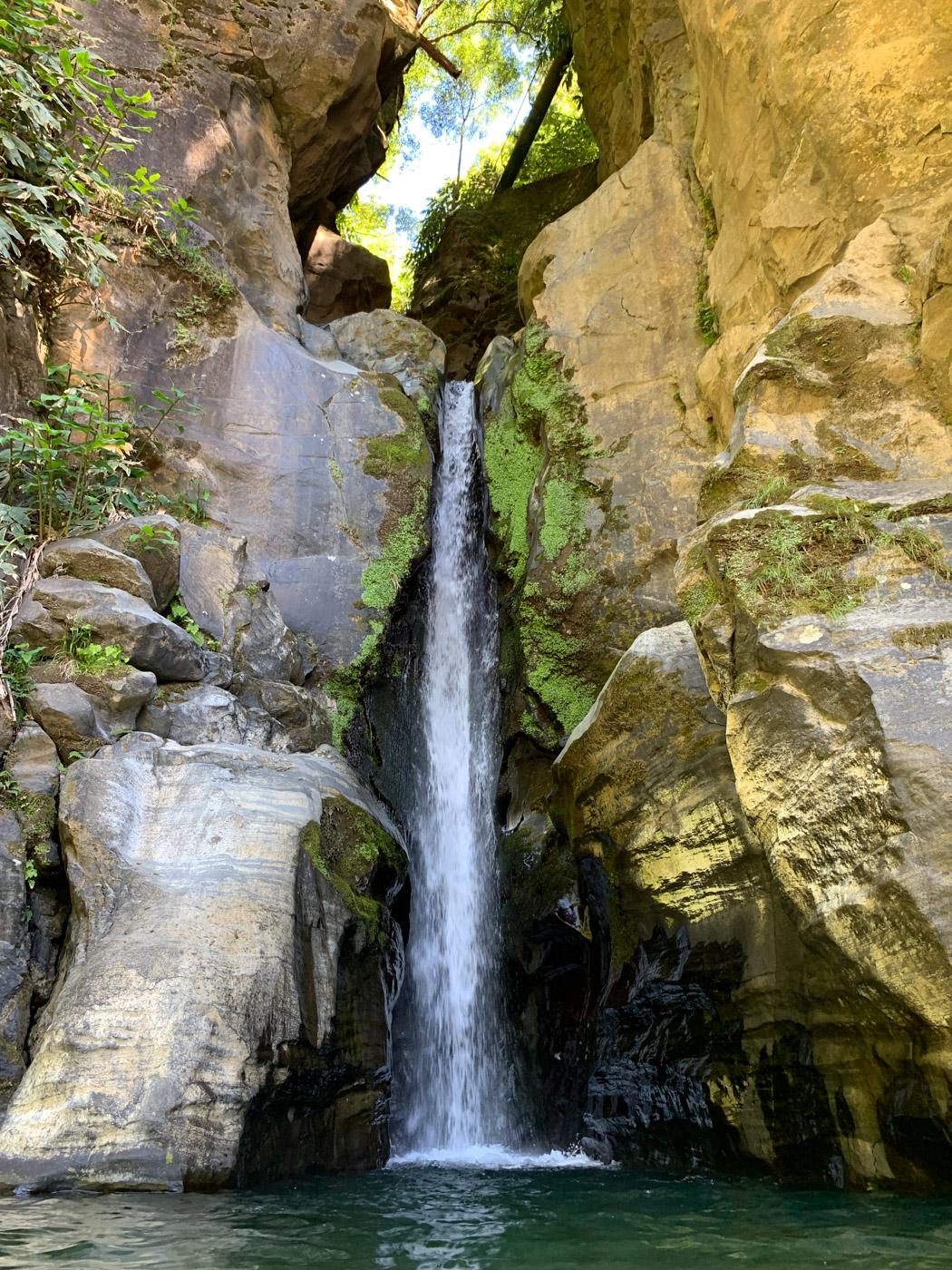
This is another beautiful waterfall with a small lake at its bottom. It is located in Ribeira Grande and is called the ‘Salto do Cabrito’ and is a drop of about 40 metres. We had a refreshing swim there, together with other people that walked the hikes nearby and come here for a refreshing dip.
23. Have a boat tour to Vila Franca do Campo islet
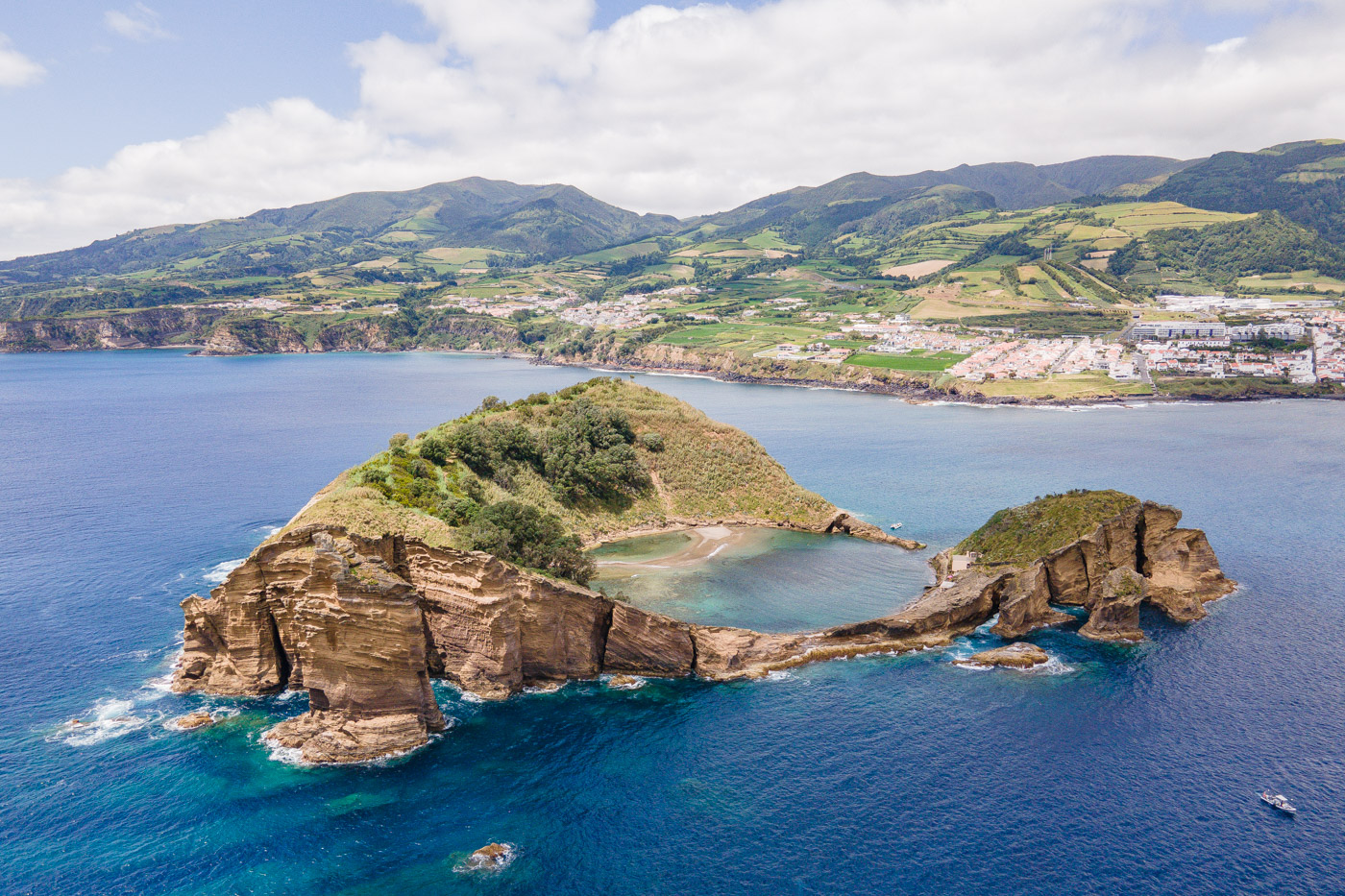
The photogenic Vila Franca Islet is a small uninhabited islet off the southern coast of São Miguel, opposite the village Vila Franca do Campo. The islet is volcanic cone’s crater, with the particularity of being filled with sea water. Since it has become a protected nature reserve, visits have been limited to 400 people per day.
24. Drive to the quiet Nordeste town
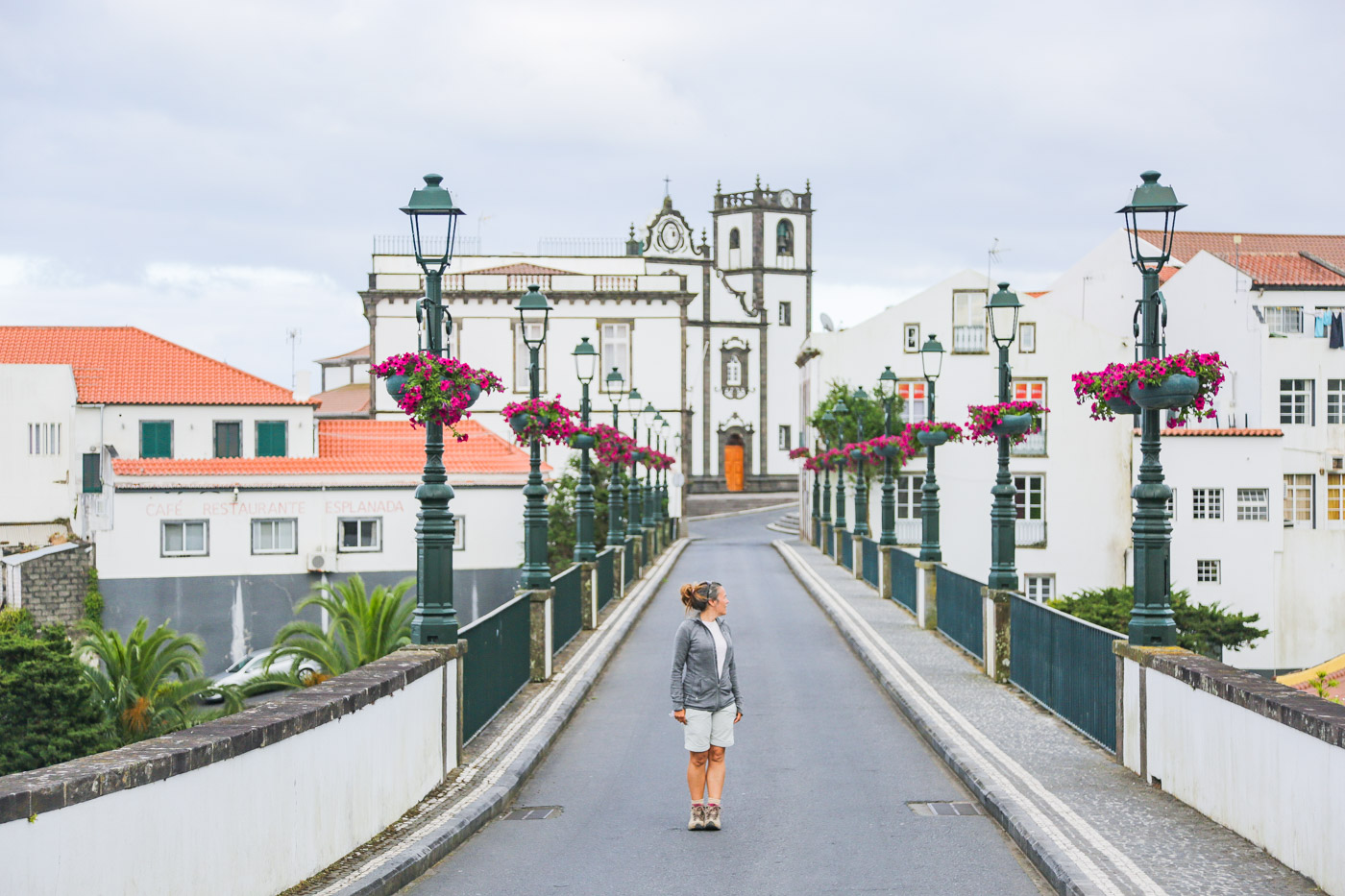
The Nordeste town is a really photogenic hamlet, with an aesthetic seven-arch bridge and a pleasant old town and square with a bandstand. After a simple lunch in a tiny restaurant, with a terrace, we walked for a little more than a kilometre to the lighthouse at Ponta do Arnel.
25. Walk down to the Ponta do Arnel lighthouse
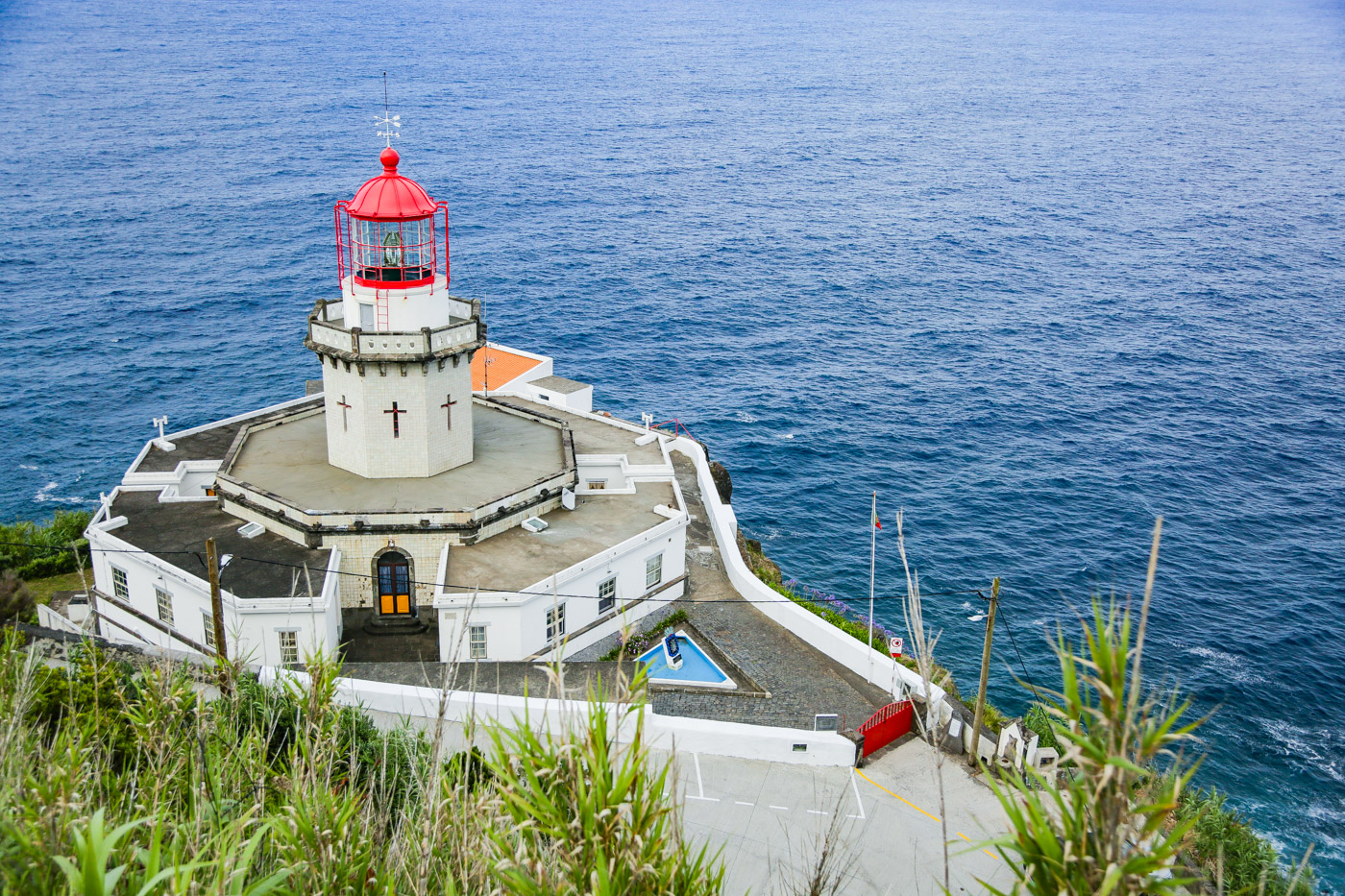
It first impressed us because of its location, down a steep cliff – so steep that visitors are advised to leave their cars at the top of the cliff and walk down (we saw a driver stuck at the lighthouse, and unable to drive up the road. The lighthouse keeper had to come to his rescue and drive his car up). From an architectural point of view, this is also a unique lighthouse, with an octagonal tower and building.
Tip: All lighthouses in Portugal are open to the public and can be visited on Wednesdays afternoon.
26. Discover the off the beaten track Lagoa do Congro
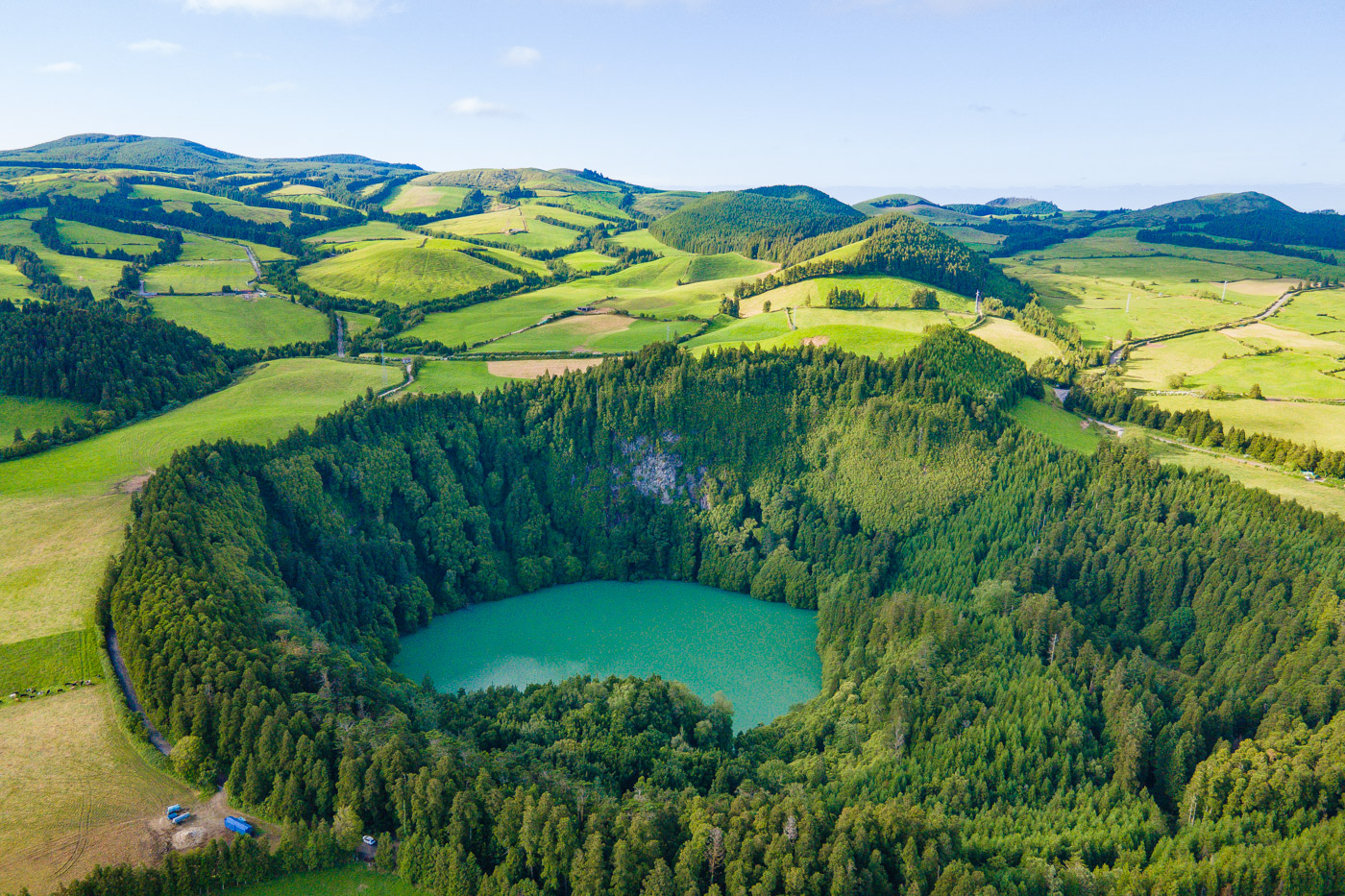
From the parking, there is a short walk to the lake; about 700 metres of a path that descends through yet another magic forest, with a lot of vegetation, so thick that only a few rays of sunlight reach it. We had the feeling that it was getting dark too quickly, but as soon as we reached the margin of the lake, away from the trees, we realised it was still daylight. This lake is the result of a volcanic explosion that happened almost 4,000 years ago. Contrary to the majority of the lakes in the Azores, it is not inside the crater of a volcanic cone. Instead, it is located in a maar crater looking like a huge hole in the flat land surrounding it.
27. Drive or walk along the Alameda dos Plátanos
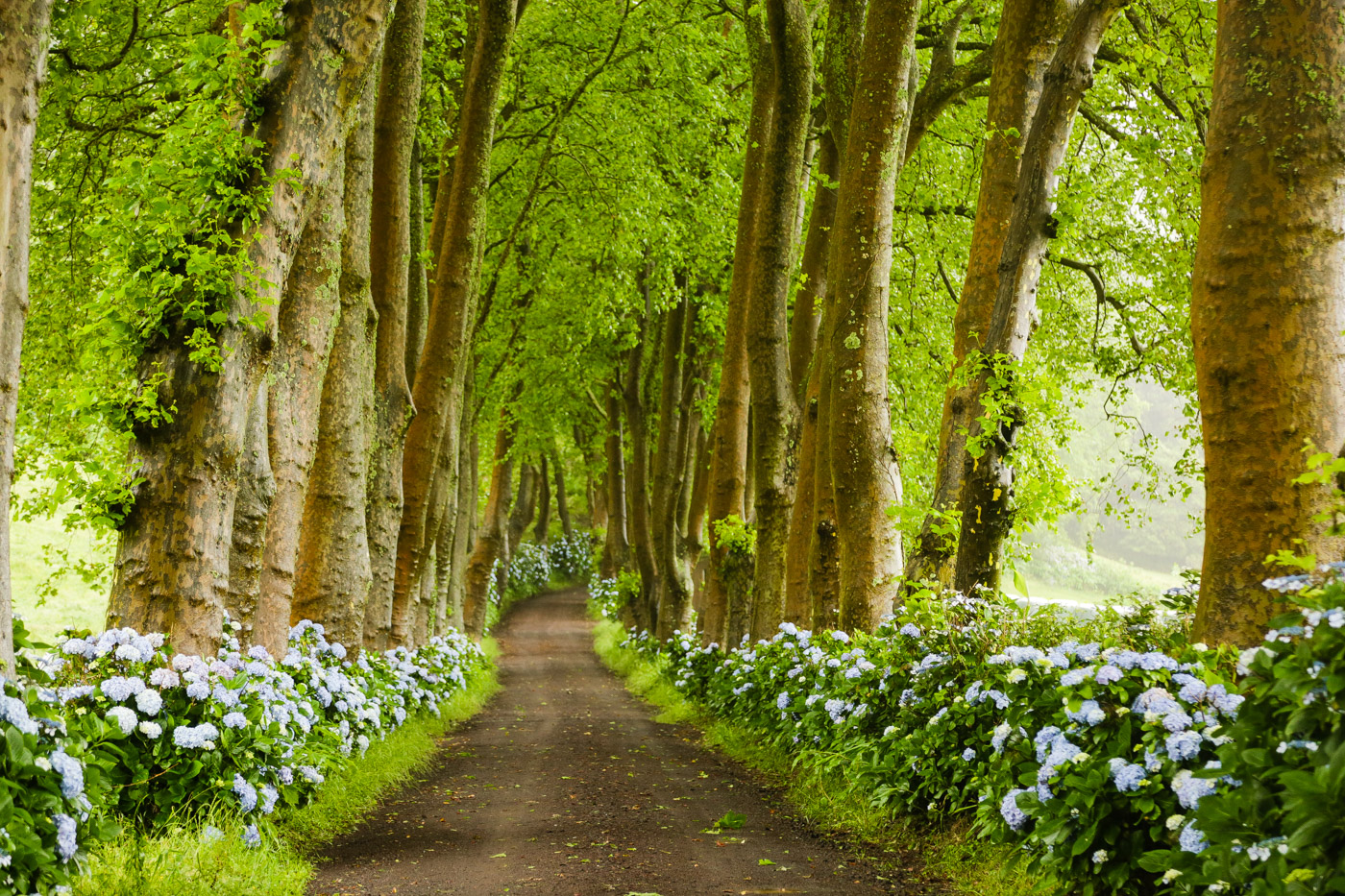
The three kilometres of the Alameda dos Plátanos, in Povoação, are flanked by more than six hundred imposing plane trees and hedges of colourful hydrangeas. This is one of the secret places in São Miguel but it really is worth the detour to find this beautiful place.
Where to find it: Check the avenue’s Google location here
28. Canyoning down the Ribeira dos Caldeirões watercourse
Along with the hiking trails in the Nordeste region, particularly those in and around the Parque Natural dos Caldeirões, there are also several canyoning opportunities. This park follows the Ribeira dos Caldeirões watercourse, which flows down the slope, creating a series of waterfalls. Canyoning them was in our plans.
Tip: We had the canyoning experience with the folks at the Azores Adventure Islands and recommend it.
29. Have the most delicious meals
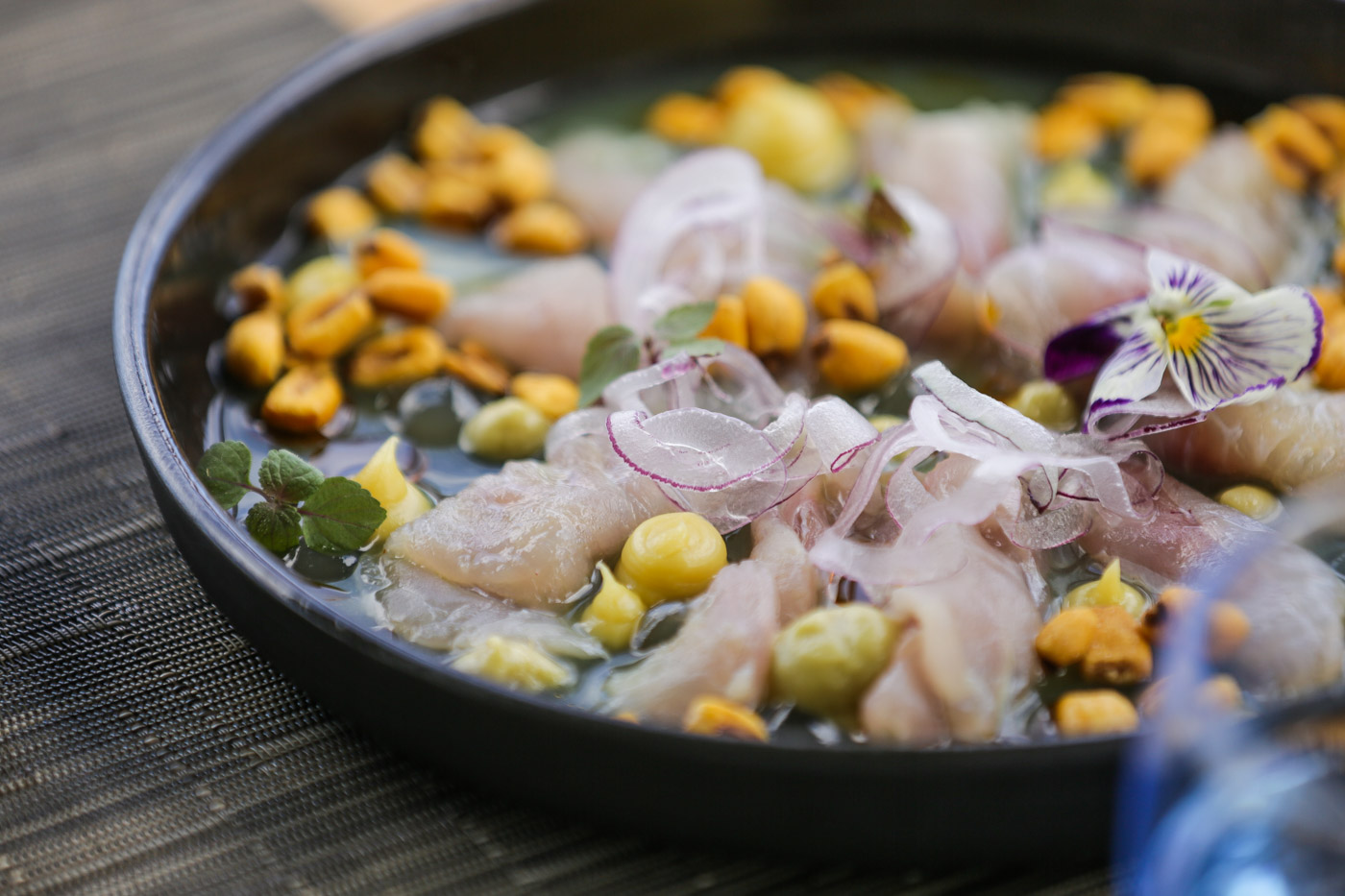
Food in São Miguel is not only about traditional dishes. Many restaurants have a great selection of international dishes using the fresh ingredients that come right off the coast. For that reason we found many much liked international fish dishes, such as ceviche or sashimi…
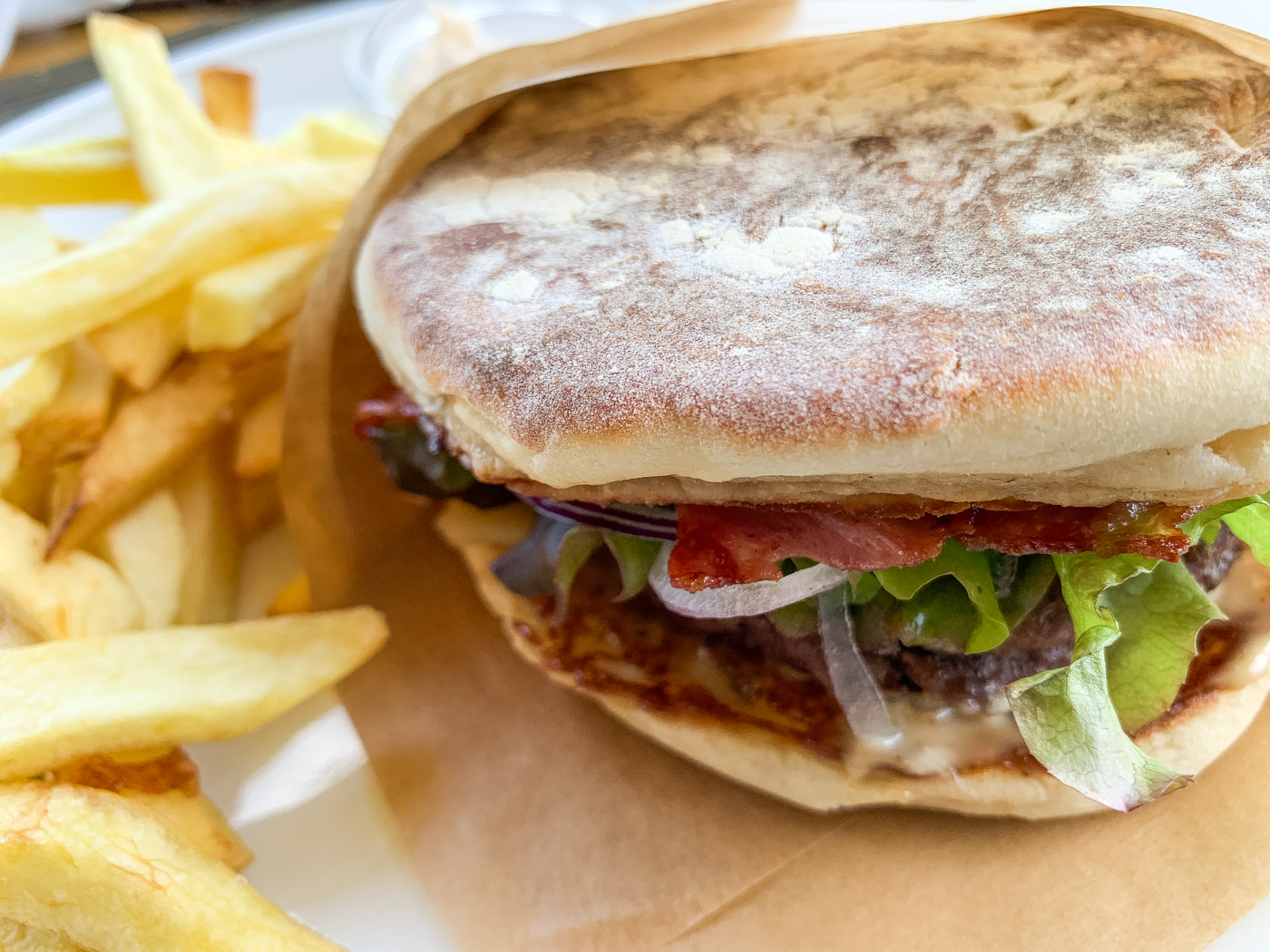
But the Azorean gastronomy is not only about fish. With so many cows feeding freely in the open meadows, it is no wonder that meat, especially beef, in the Azores is very tender and tasty. Even a quick burger gets at another level when prepared witj local meat and with a special local bread (pão lêvedo).
Tip: We recommend a visit to the white Azores restaurant for some tasty food.
30. Ponta da Ferraria Lighthouse
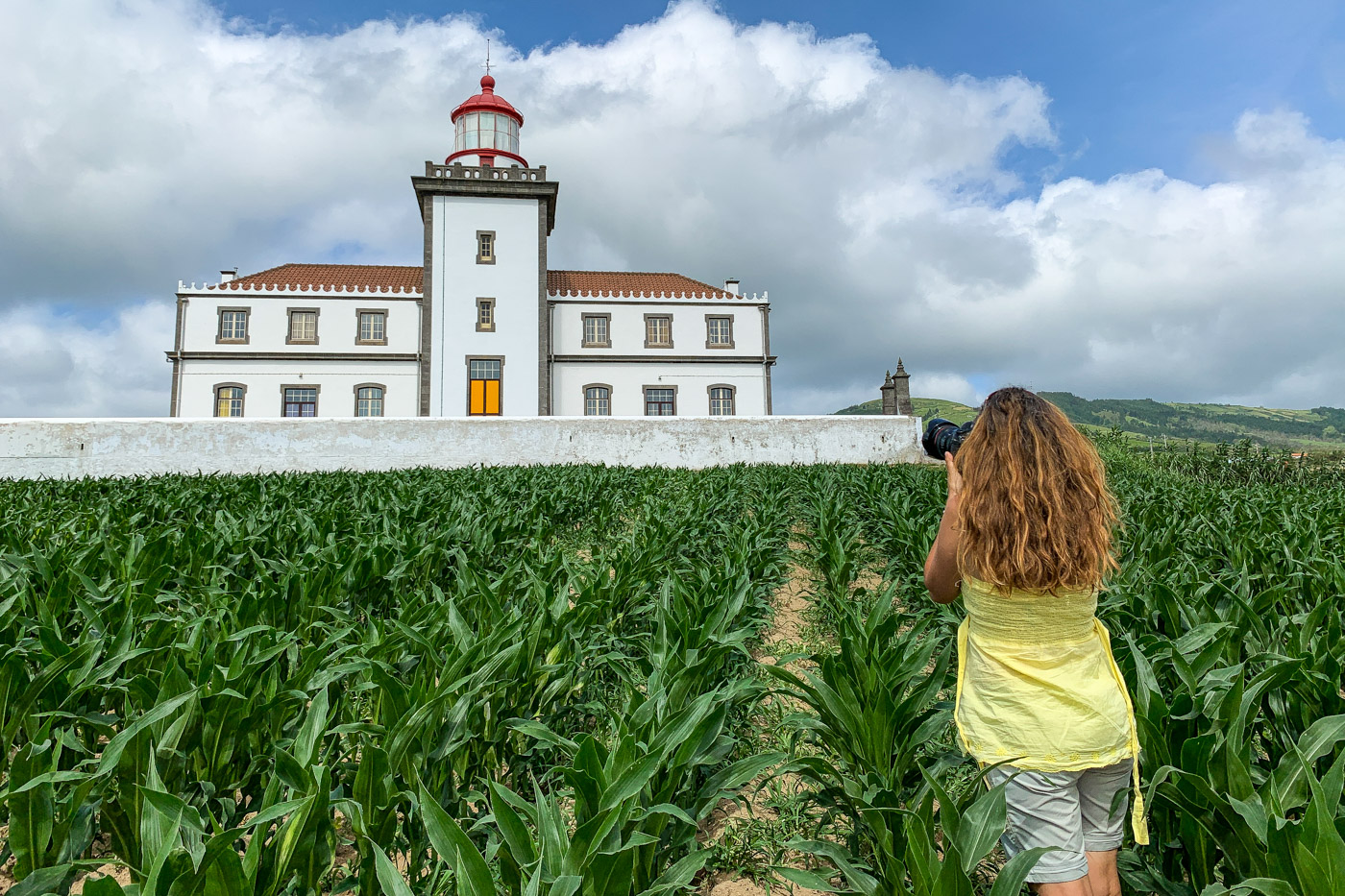
This lighthouse s located on the westernmost coast of São Miguel, in the small locality of Ginetes. Its prismatic tower is white and has a red glass-house for the lamp on top of it. It is said that it is the largest lighthouse of the Azores, and it is the second oldest in São Miguel.
31. Enjoy the beach of Santa Barbara
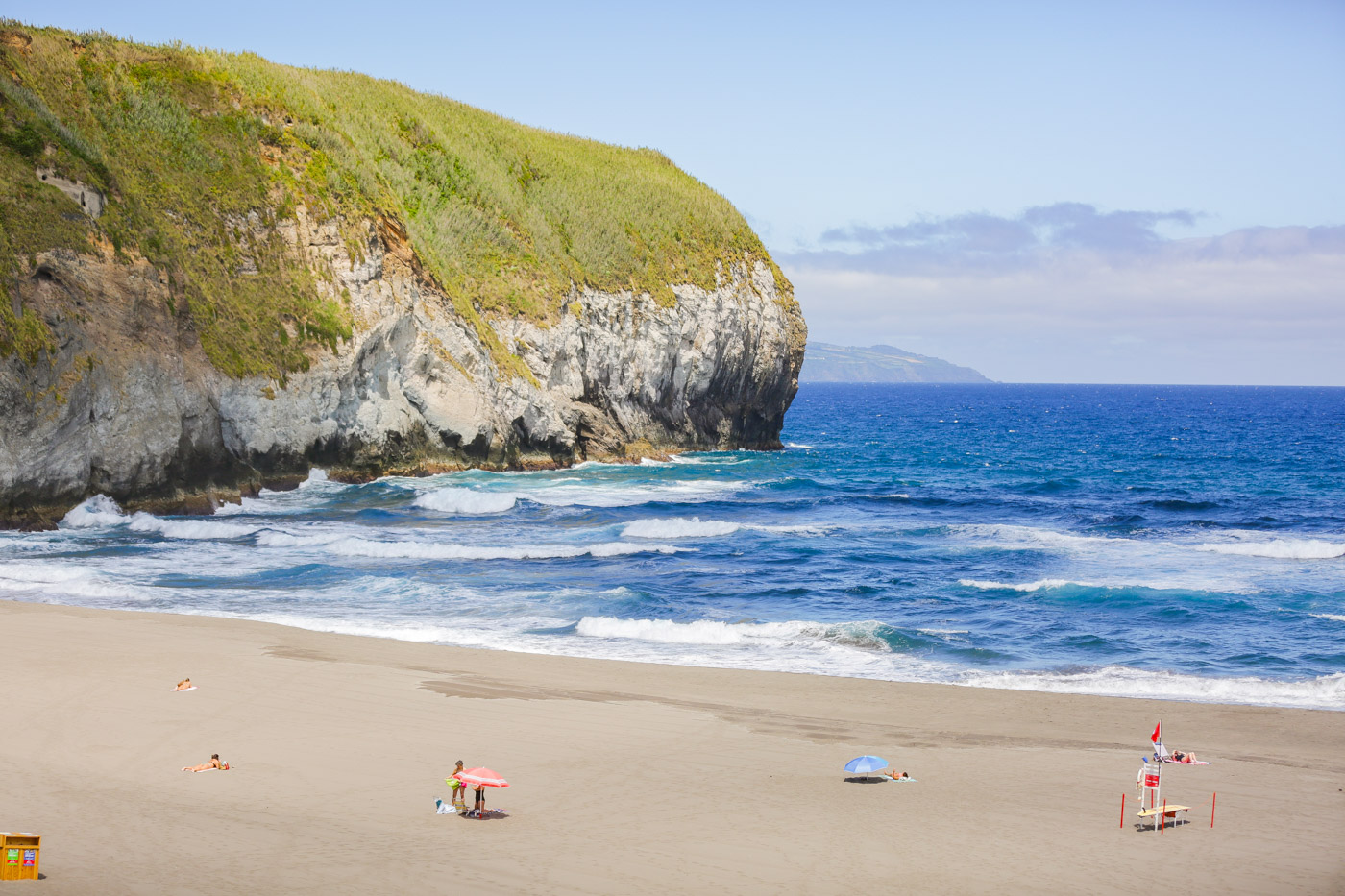
Santa Bárbara beach is one of the longest beaches in São Miguel, with one kilometre of a lovely golden sand beach. Even though the Azores is not particularly known for surfing and bodysurfing, there are a few good beaches with a good swell, ideal for these sports, such is the case of Santa Bárbara.
32. Visit the windmills in São Miguel
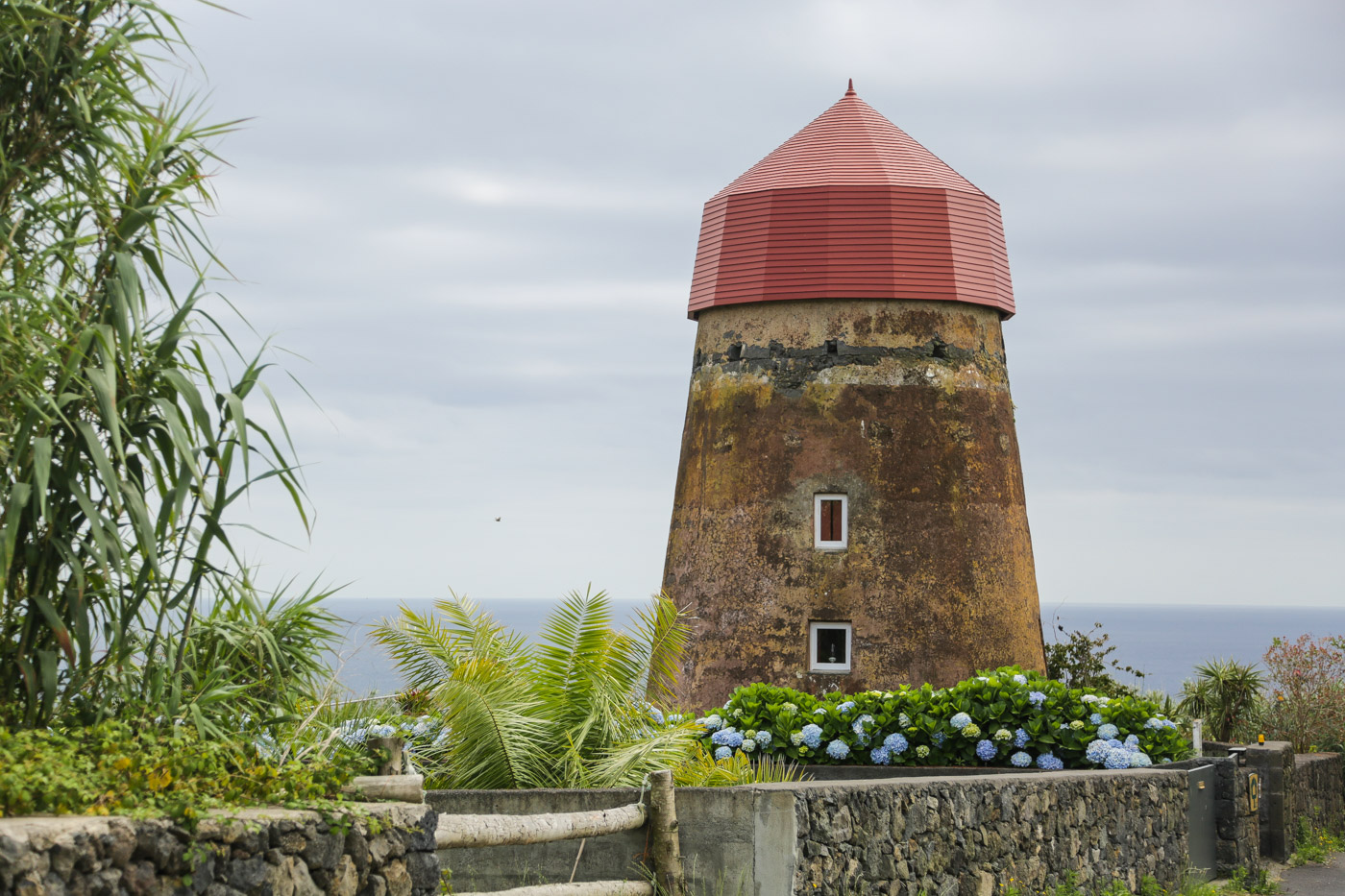
This windmill is one of the so called ‘Dutch’ type mill and is found mainly on São Miguel, Santa Maria and Graciosa Islands. They are easily recognisable because of their conical stone-built base with a wooden semi-ovoid rotating roof, and often have four cloth-covered sails. This beautiful example has been converted into a guesthouse.
Tips to help you plan your visit to São Miguel island, Azores
- COVID 19 Travel Restrictions
The Azores have remained in the green zone of the safest destinations for holidays in 2021. The government of the Azores is taking the Covid pandemic very seriously, and all travellers who arrive without a negative test, will be tested upon arrival as well as on the 6th and 12th days of their stay. Costs are supported by the government and the procedure is quick and smooth. Covid 19 should not hold up your visit to the Azores.
- Free Flight Routing Service to a Second Island
SATA Air Açores provides a free routing service to passengers travelling within the Azores, and to or from Mainland Portugal or Funchal. In practice this means that if you want to visit, let’s say, Flores, you only need to have a ticket to Terceira or São Miguel (the archipelago’s gateways), and do not need to buy another ticket to continue to Flores. You get a free routing to Flores (certain conditions apply, though).
- 35 EUR Safe Destination Voucher to Spend in the Azores
As a reward for arriving with a negative test and making a safety registration online, the government of the Azores is offering the Azores Safe Destination Voucher to all visitors, in the amount of 35 €. You receive the voucher via email once your registration is confirmed. The voucher is valid for 20 days counting from its issuing date and you can use it on many services and products (including car rental agencies, restaurants and travel agencies). Get your Azores voucher here.
- Transport during your visit to São Miguel Island
For travellers interested in seeing different villages, stopping at lookouts, having a break for a swim, the easiest solution is to rent a car or bike. There are several car rentals in São Miguel, but it is better to have this organised before arrival, to make sure you get a car. In the high season, the island can get busier.
OUR PICK: We rented our car with Autatlantis and recommend the experience.
- Useful Websites – Spotazores
Weather changes very quickly in the Azores. Locals usually say that sometimes the weather is so capricious that the four seasons show up in only one day. Also, sometimes it is raining on one side of the island, and the other side has a bright sunshine. In order to help you search for the best weather, there is a website and app (Spotazores) that features live webcams located in different places of the island. It makes it easier to decide which way to go if you are seeking for good weather or running away from fog. Here is the link to spot Azores.
Interested in São Miguel Island? Read also the following articles:
-
Terra Nostra – A Remarkable Garden In São Miguel
-
What to visit in São Miguel Island – Azores
-
The Windmills Of The Azores
-
Flavoured Azorean Food
And find out more about the other islands:
– What To Visit In Terceira Island (Azores)
– São Jorge – The Island Of The Fajãs (Azores)
– What To Visit In Pico Island (Azores)
– What To Visit In Faial Island Azores
– What To Visit In Corvo Island Azores
– What To Visit In Flores Island Azores


